Philip Catron lives the green American Dream at NaturaLawn of America P58





How

Philip Catron lives the green American Dream at NaturaLawn of America P58





How



In every industry, Latinos are not only excelling, but they are also helping shape the American dream. These five executives share their accomplishments and legacies that they are building.


58.
66.
72.
76.


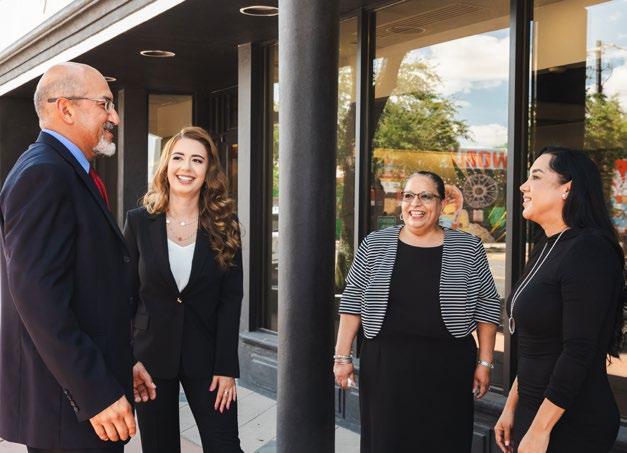
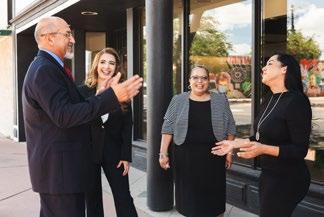
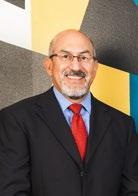
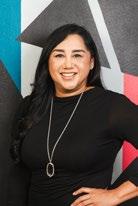
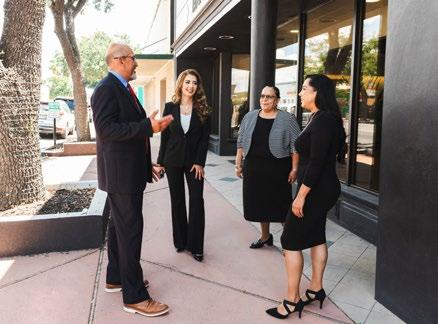
VIDA brings hope, jobs, and education to the people of the Rio Grande Valley, thanks in part to Isidro Ramos and Veronica Montemayor
INSPIRED TO GROW
Lisseth Zouhbi transitioned to the nonprofit industry to support the growth of Child Care Resource Center and focus on internal development
A SMART BET
Yanina de Vargas shares her journey to the US from Argentina and how she mentors the next generation of leaders
LEAN INTO LEADERSHIP
Italo Intriago made his ambitions clear after years as an individual contributor and now he’s leading a critical enterprise hardware services team for Red Hat
A GLOBAL MINDSET
Alejandro de Castaneda believes that commitment to understanding different countries adds to the bottom line
HOW TO NAVIGATE CHANGE
Valeria Plastino shares how growing up and practicing law in Argentina prepared her to lead her team through change
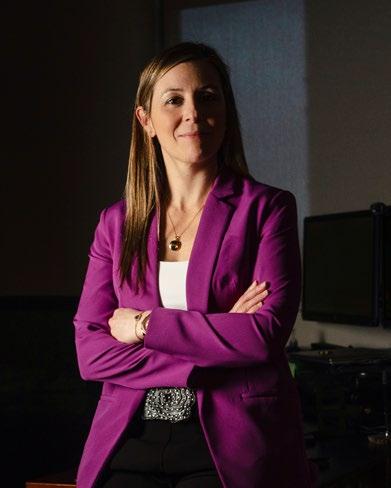
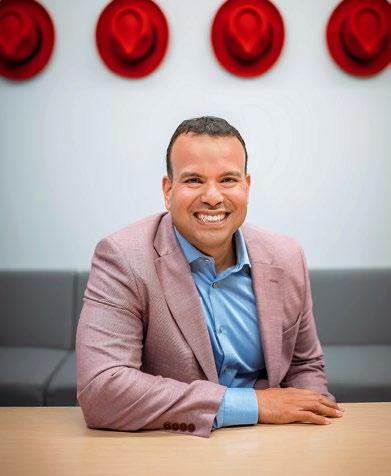


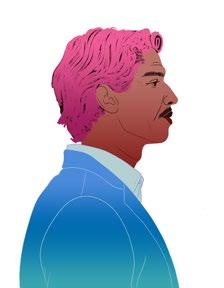

FOR NEARLY 250 YEARS, IMMIGRANTS HAVE JOURNEYED TO THE United States in search of better opportunities for themselves and their families. The American Dream has been deeply rooted in the country’s cultural ethos since its beginnings and drives each generation toward a brighter future. In this issue of Hispanic Executive, we wanted to dive into this concept of the American Dream and how Latinos are fulfilling their own dreams and opportunities. You’ll learn how Philip Catron founded NaturaLawn of America, because of his passion for environmentally friendly lawn care, and now creates franchising opportunities for people to follow in his footsteps. Juliana Londoño shares how she became the mental health advocate she didn’t have by launching her own company to help other Latinos break through barriers within the mental healthcare space.
Before you dive into this issue, we wanted to share what the American Dream means for us and our families. We hope you see some of your own dreams and aspirations mirrored in these pages.
As I look back on my family’s journey from Puerto Rico to the US, I see the American Dream as a promise fulfilled. While the road was certainly challenging at times, it paved the way for achievements and opportunities that were once distant dreams. Adapting to a new culture, language, and way of life was no small feat. However, to us, it meant the chance to start anew and create opportunities that were not (and still are not, sadly) readily available in the island.
Vianni Lubus, VP of Hispanic Division and Head of Audience & Engagement
As a Cuban American, the American Dream takes on an even deeper significance for me and my family. It’s a testament to the resilience and spirit of immigrants who have come to this country seeking freedom, opportunity, and a better life. For many Cuban families like mine, the American Dream represents the culmination of generations of sacrifice and determination.
Growing up with stories of my family’s journey to the United States, I’ve always been reminded of the importance of seizing the opportunities that this country offers. My Cuban heritage instilled in me a strong work ethic and a sense of gratitude for the freedoms and opportunities I have here.
The American Dream, for me, is a reflection of the values and aspirations that my Cuban ancestors held dear—freedom, opportunity, and the chance to build a brighter future for themselves and their loved ones. It’s a reminder of the incredible journey that brought my family to this country and the endless possibilities that lie ahead.
As a Latina executive of Cuban descent, I carry the legacy of my heritage with pride, knowing that my success is not just my own, but a tribute to those who came before me and paved the way. I am committed to honoring their sacrifices by continuing to strive for excellence and helping others along their own paths to achieve the American Dream.
Suleidys
Tellez, Director of Social Media
As a first-generation Mexican American, with parents who migrated to America in search of something more, our dreams are similar: for my parents, their dream was to come to the US in search of opportunities, raise a family, get by economically, and to ensure my sister and I never lacked food, shelter, and education. They wanted to see us go to a university, become titulados, and be in a much better place economically. And maybe, someday, be recognized with the same dignity and respect as other Americans.
Luckily, they accomplished most of their dream (the latter is still a work in progress). For me, my dream was to be the first in my family to graduate college and acquire my bachelor’s degree, be able to lift my parents out of poverty, and be a lot closer to financial stability—which, thank goodness, I’ve accomplished so far.
Perhaps, one day, I’d like to own a spacious home that’s bigger than our tiny apartment, but most importantly, my dream is to be at a place where we are no longer trying to survive, but instead, be able to live calmly and at ease. Knowing things will be alright, regardless of what that looks like.
Arturo Magallanes, Designer
SUBSCRIBE TODAY AT HISPANICEXECUTIVE.COM/NEWSLETTER
Scan the QR code with your smartphone camera to subscribe to the newsletter.





The cover illustration, created by our designer Arturo Magallanes, captures the essence and spirit of the American Dream. The bright color palette, rainbow, and clouds show optimism, hope, and resilience as the three people walking toward the star showcases the individual journeys we take in pursuit of a better life. The star, an emblem of the United States, shows three Latinos filled with pride and determination—they are the American Dream. We hope that you can see yourself reflected inside the star, that you are the American Dream.
Editorial Director
Frannie Sprouls
Senior Editor
Melaina Cecilia de la Cruz
Editor
Navpreet Dhillon
Associate Editor
Darcy Waskiewicz
Staff Writers
Noah Johnson
Billy Yost
Contributors
Zach Baliva
Lucy Cavanagh
Frank DiMaria
Will Grant
Keith Loria
Claire Redden
Joseph Stark
Art Director
Anastasia Andronachi
Designer, Hispanic Executive
Hispanic Executive® is a registered trademark of Guerrero, LLC
©2024 Guerrero, LLC. guerrero.co
1500 W. Carroll Ave., Suite 200 Chicago, IL 60607
Facebook: @hispanicexecutive
LinkedIn: @hispanic-executive
Twitter: @HispanicExecMag
Instagram: @hispanicexecmag
YouTube: bit.ly/youtubehemag
Arturo Magallanes
Designer
Rebecca Kang
Photo Manager & Video Director
Cass Davis
Contributing Photo Editor
Sarah Joyce
VP, Hispanic Division and Head of Audience & Engagement
Vianni Lubus
Director, Events
Jill Ortiz
Community Engagement & Communications Manager
Cristina Merrill
Director, Social Media
Suleidys Tellez
Social Media Coordinator
Rodrigo Cortés
Reprints
Reprinting of articles is prohibited without permission of Guerrero, LLC. Printed in China. For reprint information, contact Reprints & Circulation Director Stacy Liedl at stacy@guerreromedia.com.
Industry Partners




CEO & Publisher
Pedro A. Guerrero
President, Group Publisher
Kyle Evangelista
Chief of Staff
Jaclyn Gaughan
Sales
VP, Enterprise Solutions
Aaron Meier
Senior Director, Sales
Hannah Tanchon
Enterprise Sales Executive
Stuart Ziarnik
Senior Director, Corporate Partnerships & DEI Solutions
Krista Horbenko
Director, Talent Acquisition & Engagement
Haylee Himel
Talent Acquisition Manager
Jordyn Gauger
Content & Advertising Managers
Allison Kolosick
Roman Magallanes
Chief Operating Officer
Tere Pérez Lobatón
VP, Finance
David Martinez
Director, Circulation
Stacy Liedl
Head Developer
Jose Reinaldo Montoya
Senior Director, Client Operations
Cheyenne Eiswald
Account Manager
Abigail Stern
Senior Manager, Client Services
Rebekah Pappas
Manager, Client Services
Brooke Rigert
Communications Coordinator, Creative
Santiago Giordano


Have you ever gotten frustrated at someone who doesn’t know the difference between “año” and “ano”? Have you gotten offended at a Hispanic colleague who showed up late to your party, or wondered what the heck is up with all the new Latinx/Latine variants?
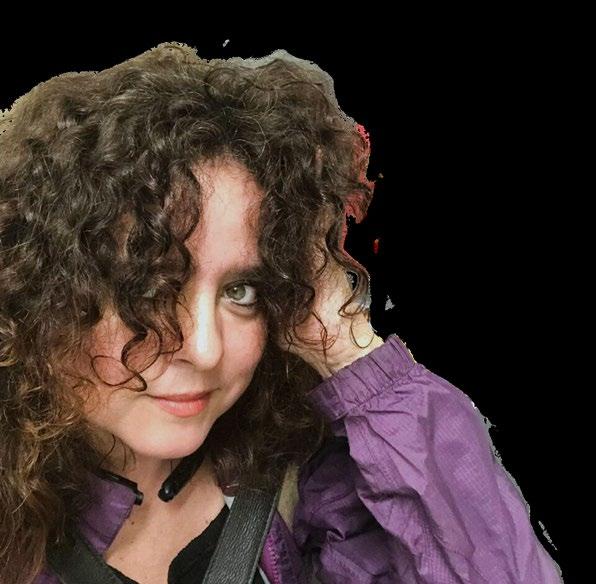
If so (or if you’re simply looking for a bit of a laugh), check out Laura Martínez’s new Hisplaining column. She began writing the column in 2022 to help today’s leaders smoothly navigate the multicultural business world, and Hisplaining has quickly become a favorite of our readers. But be warned—this column is handled with a serious dose of humor.



Hispanic Executive’s new Publisher’s Circle is a digital-only platform for selected leaders to share their thought leadership through high-quality content. As a contributor to the Publisher’s Circle, you will have the privilege of broadcasting your insights and expertise with both your peers and a readership that is at the forefront of Latino advancement in American business. Let us help you advance your leadership and become an authority. Interested in sharing your insights via the Publisher’s Circle on hispanicexecutive.com? Contact us at info@hispanicexecutive.com.
When one’s work makes an impact in the community, it transcends employment and becomes a calling. These executives have answered their call.
BY BILLY
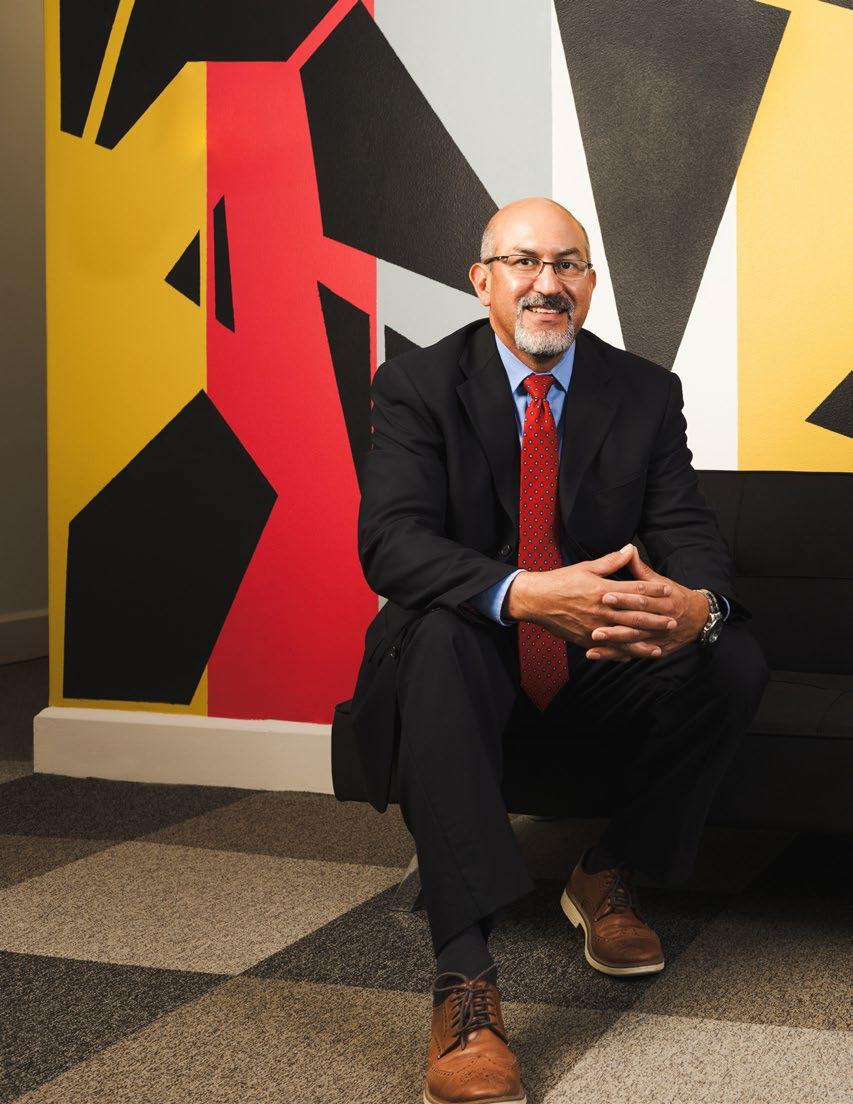
Isidro Ramos and Veronica Montemayor see success stories every day at the Valley Initiative for Development and Advancement
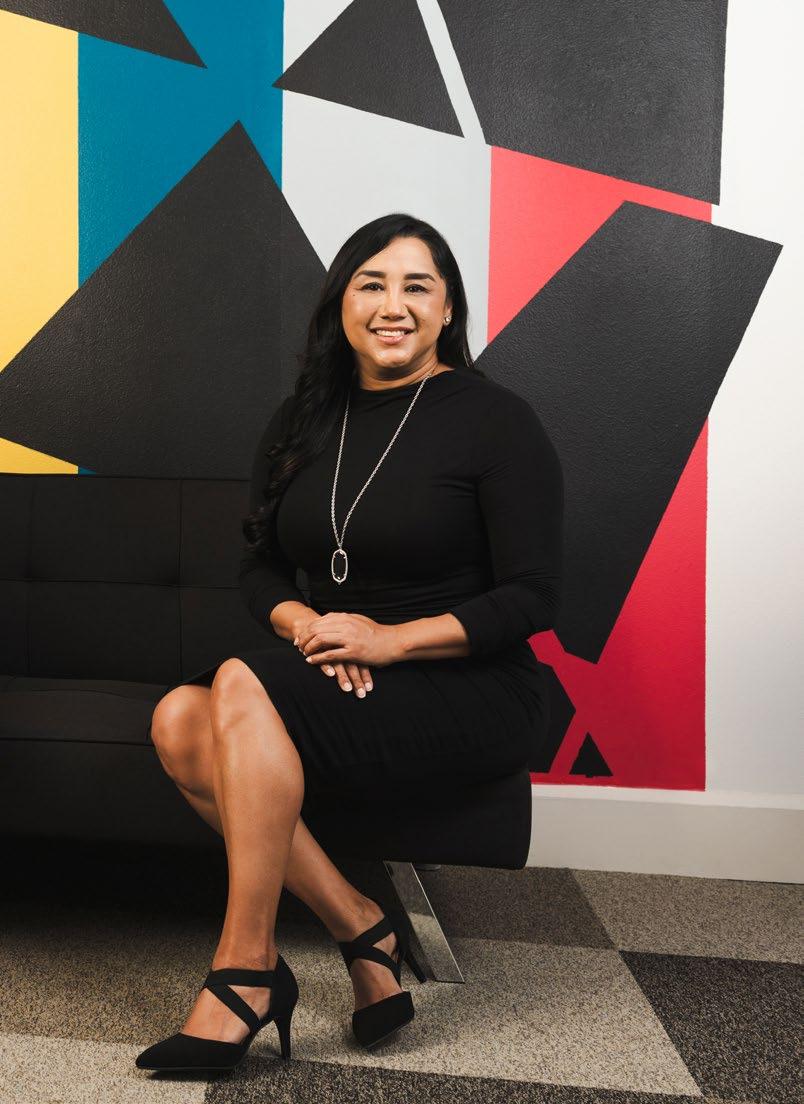
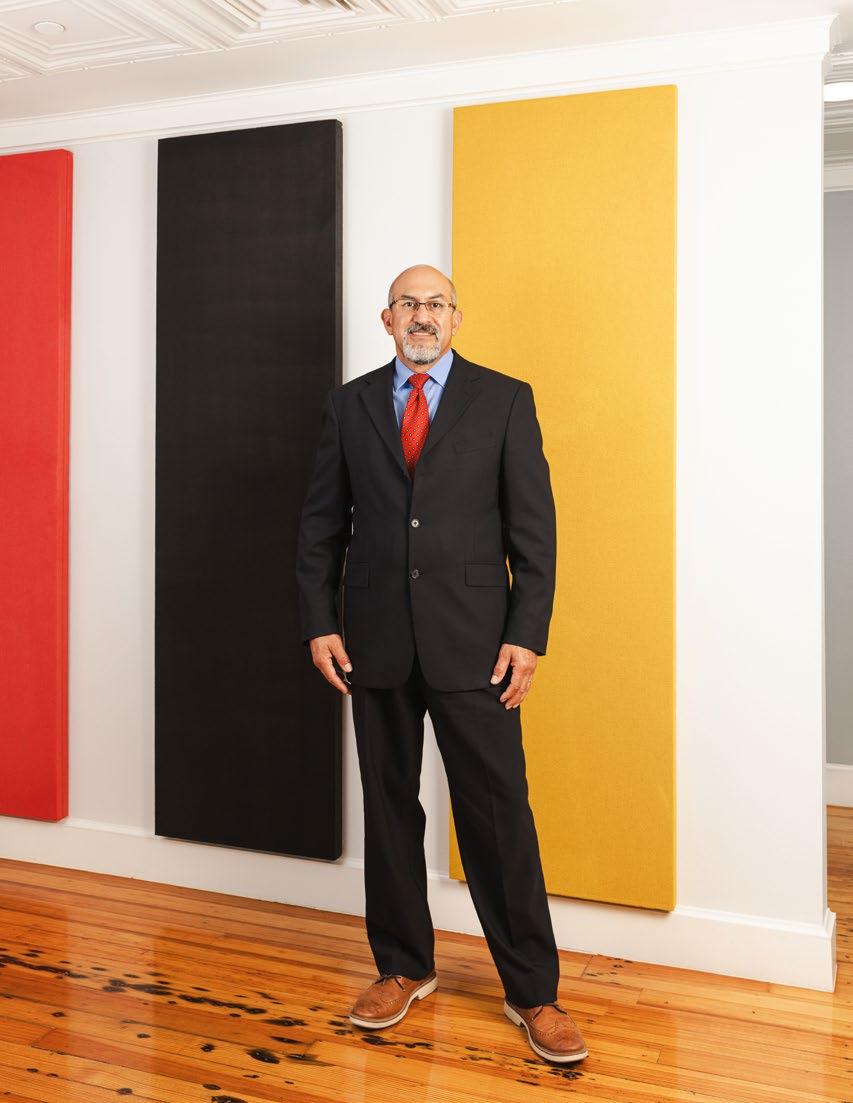
Ramos Director of Workforce & Economic Development Valley Initiative for Development and Advancement
the Rio Grande’s career guidance, training, and life skills nonprofit whose graduates have gone on to thousands of successful careers since 1995.
The organization tackles unemployment and underemployment issues of the region by creating the ideal circumstances for its residents to learn new skills for in-demand jobs. VIDA’s support services include intensive case management and financial assistance to help its program participants make better lives for themselves and those around them.
But that’s only part of what makes VIDA so special. Its job training component includes pursuing degrees and/or industry recognized credentials in fields of healthcare, STEM, and skilled trades. The program training can be as short as weeks and as long as years, but the inevitable result is individuals who are prepared for roles that desperately need to be filled.
Montemayor, director of finance, has only been at VIDA a year, but her rapport with Ramos, director of workforce and economic development, feels like it goes back years. They joke with each other, and the family-like atmosphere makes it easy to understand the care and consideration they each bring to their jobs. Ramos spent nine years with VIDA early on in his career as director of special projects before returning to the organization in 2019 to step into his current role.
Ramos currently oversees the manufacturing and skilled trades programs. In his role, he connects with training providers as well as employers to provide the kinds of skills training that can immediately be put into action in the region.
“Everything we do here is for the longterm,” Ramos explains. “Whether I’m working with instructors to organize the curriculum or doing the case management for our

“I can relate to so many of the students I see come through here, and I want to be part of their success stories. Some of them don’t even see college as a possibility. But I want them to know that it’s possible.”
Veronica Montemayor Director of Finance Valley Initiative for Development and Advancement

participants, it’s about putting our people on the pathway for lifelong learning and career success in their industry of choice.”
The degree to which VIDA invests in the case management of its participants was even a surprise to Montemayor.
“When I went to school, if I had serious questions about continuing or the direction I was going, it was a decision I had to make on my own,” she says. “There was nobody to provide guidance. I’ve learned that the success of VIDA is so closely tied to their case management and the care they take in the people going through our programs.”
Montemayor is responsible for making sure that VIDA continues aiding those in the Rio Grande Valley. The director has to consistently make sure that her organization dots all the i’s when it comes to fulfilling the obligations of the grants it receives— grants like the $3 million it received from the US Department of Labor as part of its nursing expansion program to address the nursing shortage in the area.
Whether I’m working with instructors to organize the curriculum or doing the case management for our participants, it’s about putting our people on the pathway for lifelong learning and career success in their industry of choice.”
–Isidro Ramos
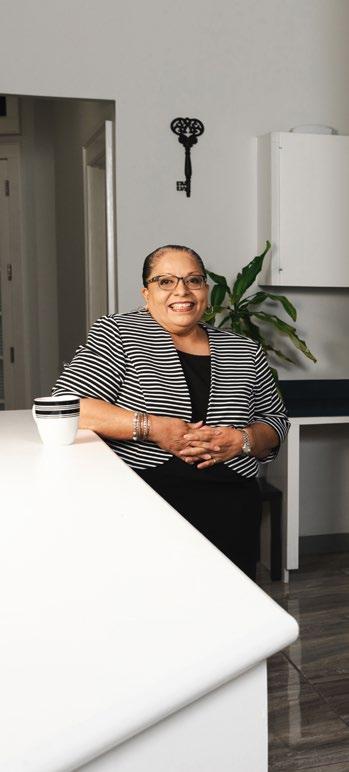
VIDA was the only Texas-based organization to secure the grant and just one of twenty-five public-private partnerships in the entire US to be awarded the designation.
But it’s not just nursing. Ramos has been busy creating a curriculum for liquid natural gas jobs that will be coming to the area. That comes on the back of the extensive commercial electrician training he’s helped implement. Ramos has seen so many success stories come through the electrician program that he’s not sure of which student best illustrates the power of VIDA.
“I guess we can talk about Michael,” Ramos finally decides. “Michael has gone through three levels of our training. He’s now buying a nice home. And, to me, that pretty much summarizes everything this program is about. It’s the American Dream. It’s owning a home. And it’s bringing economic development to the community.”
Montemayor sees her own journey as one that could have been so positively impacted by a program like VIDA. After having her daughter at age seventeen, she would slowly pursue her own education, one

that would result in her getting her master’s in finance.
“I just know how hard it can be for people who start their families early,” Montemayor explains. “I can relate to so many of the students I see come through here, and I want to be part of their success stories. Some of them don’t even see college as a possibility. But I want them to know that it’s possible.”
Montemayor and Ramos most routinely interact when Ramos is creating a new program.
“It’s about the money, money, money,” Ramos says, laughing. “I’m the one that’s spending it. But I think we’ve been pretty successful together thus far.”
Both speak in their belief of the power of education. Both share their desire to help more people in their own careers. They see success stories play out each and every day at VIDA. They are both actively helping VIDA participants write those stories.
It’s the kind of work that can’t be celebrated enough.
BY NOAH JOHNSON
Juan Alexander Concepción has been on a lifelong journey to solve systemic problems plaguing Black and Brown communities, one that he’s proud to continue at Boston Scientific
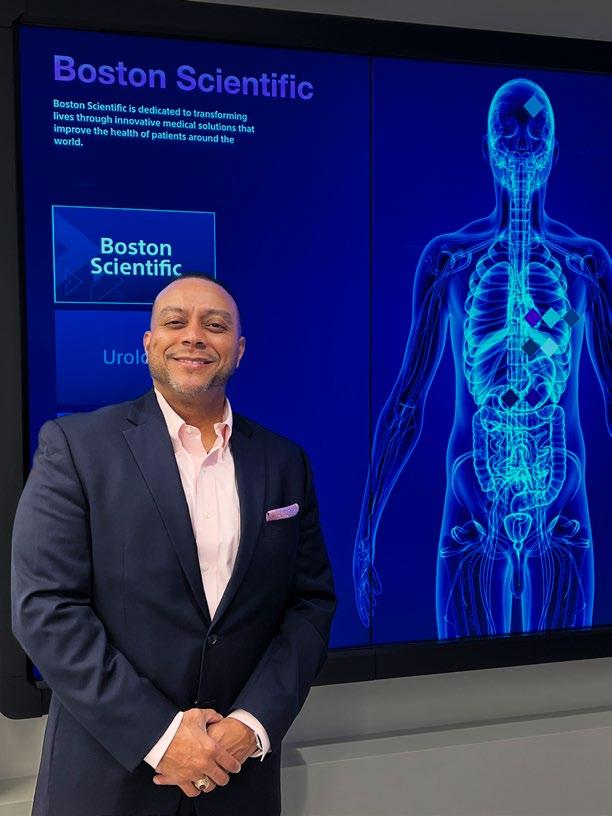
Juan Alexander Concepción Senior Counsel, Legal Director of Global Employment
JUAN ALEXANDER CONCEPCIÓN, WHO who immigrated to New York from the Dominican Republic over forty years ago, was raised by his mother in Washington Heights, where he witnessed rampant crime, drug use, and frequent police misconduct. For as long as he could remember, he wanted to help solve the socioeconomic problems that many Black and Brown communities faced.
But, as a young professional, he struggled to figure out the best way he could contribute.
“After my first two degrees from Boston College, I did a quick stint in teaching, wanting to give back in some way. I felt education was one of the highest contributions one can make to communities like ours, but after a while, I felt powerless because there was a greater need,” says Concepción, who is currently senior counsel and legal director of global employment at Boston Scientific. “Some people do make bad choices in life but if you take a deeper look, many are also caught up in the same patterned web their fathers, mothers, and grandparents were trapped in. It became clear to me that to make a difference, I had to learn the law.”
Concepción decided to pursue a law degree at Boston College, initially focusing on constitutional law and criminal law and procedure. At first, he thought he’d go on to be “the
meanest prosecutor in the world,” helping to fight back against many injustices he’d seen as a kid in the Heights. But even that, he says, would’ve been too narrow of a goal.
“I started to widen my lens and saw that I was still getting too caught up in one corner when the problems were more structural,” he says. “It made me think that I needed to strengthen myself and climb to a position with enough influence and resources to start shifting the way the machine works. I slowly realized I didn’t need to go at problems directly, but I could sail at a deliberate speed, not lose steam, and help achieve the results I wanted to see as long as I stuck with my mission.”
After graduating with degrees in business and law from Boston College, Concepción is doing just that. He started his foray into the legal world at Nixon Peabody, where he worked as a business litigator. Countless hours of discovery, questioning witnesses, and appearing in court showed him what advocacy looked like and what it
meant to give a voice to others. As one of very few Afro-Latino lawyers in his sphere, he also learned to embrace the powerful things that made him unique while soaking up as much knowledge and wisdom from mentors as he could.
Nixon also exposed him to labor and employment matters, another area of the law that he had considered in law school which turned out to be one that he believes is perfectly in line with his racial and social justice passions.
“I can’t think of anything more important than a person’s life, freedom, and pursuit of happiness, which means to a great extent the opportunity to earn a solid living and to set your family up to enjoy life sustainably,” he explains. “To most, that’s being able to pay for healthy food, to live in a nice house, to go to the doctor when we’re sick. As an employment lawyer, my job has been to help employers create positive work experiences for greater success, so people
“I slowly realized I didn’t need to go at problems directly, but I could sail at a deliberate speed, not lose steam, and help achieve the results I wanted to see as long as I stuck with my mission.”
are able to do achieve these things and to thrive in society.”
After serving as a litigator and employment counselor to employers in highly regulated industries like healthcare, transportation, and telecommunications, Concepción brought his vision and wealth of expertise to Boston Scientific. There, he prides himself on being part of a leadership team that’s dedicated to upholding values of caring; diversity, equity, and inclusion; and social responsibility while advancing science for life.
“I think people feel confident in what I’m doing here because I’ve stayed true to what I believe—people should be treated with respect and dignity as we confront difficult situations,” he explains. “If we stick by that, we can make better decisions. Even if people disagree with certain decisions, they can at least get behind our process. Most workplace conflicts sharpen when people aren’t given the opportunity to understand what’s happening to them and why, and in my role,
I’ve put an emphasis on that kind of transparency and that level of care and respect.”
Concepción is also proud to continue to pursue his mission outside of work in many avenues. He’s a founder and current director for the New Commonwealth Fund, which aims to disrupt and reform power structures that have created generational economic and social inequities for Black, Latino, and Indigenous people. He’s a long-serving director of Lawyers for Civil Rights, efforts that won him, among other kudos, the Massachusetts Association of Hispanic Attorney’s Leadership Award for outstanding leadership and excellence in the legal community.
He also aims to give back to the institutions that helped him succeed as a trustee and faculty member at Boston College and a trustee for Cardinal Hayes High School, his alma mater.
In devoting himself to advocacy and social justice, Concepción creates a path for others to do the same.
¡Abrazo!
Focused on labor and employment law since 1958, our 950+ attorneys located in major cities nationwide consistently identify and respond to new ways workplace law intersects business.
BY BILLY YOST
After almost twenty-five years in luxury hospitality, Lisseth Zouhbi pivoted to the nonprofit industry to support the growth of Child Care Resource Center and focus on internal development
LISSETH ZOUHBI STRIVES TO EMBRACE new challenges. After almost twenty-five years of HR expertise, almost exclusively in the luxury hospitality industry, Zouhbi has embarked on one of her biggest roles yet: a chief human resources officer in the nonprofit industry for California-based Child Care Resource Center (CCRC).
A big driver for Zouhbi to embark on a new industry was to learn and expand her knowledge working for an organization that has a big impact on the community. “Every experience I have had, I’ve learned something new and grown in different ways,” Zouhbi says. “I’ve continued pursuing my education and work to see the bigger picture of how my role can positively impact others. This was a chance to have a direct impact on the local community.”
CCRC’s focus on children is especially meaningful to Zouhbi who, as a mother of two, understands just how much parents want their children to be able to thrive. She is also aware the struggle of the community not always having the economic resources or support networks to ensure the children and families have the proper resources.
At a time when many parents are paying so much for childcare and face the reality that one parent may have to put their career on hold for the betterment of their family, Zouhbi appreciates the opportunity to support an organization whose goal is to help families thrive together.
In her new role, Zouhbi has a team of forty and growing, the largest team she’s had in her career. Like many organizations, CCRC was also facing the challenge manag-
ing changes in a post-COVID environment. CCRC was continuing to grow and required a significant amount of reorganization to adapt to the post-pandemic new normal.
Zouhbi was tasked to create an organizational development department, implement Workday, and rebuild the organization’s learning and development programs to help support the organization’s growth strategies.
“I realized that in order for our growth to continue, we needed to take a step back and look at our organizational structure and assess our internal processes, training, and development programs to be able to sustain the projected growth,” she says. “Our CEO’s vision was also for CCRC to implement a robust system to improve our technological procedures in preparation for our growth.”
Lisseth Zouhbi CHRO Child Care Resource Center
Zouhbi, who joined CCRC in March 2022, says the rebuilding of the learning and development team and programs is ongoing and the implementation of Workday will be completed (at time of speaking) by the end of 2023. It was critical getting feedback from stakeholders for these changes and incorporate trends happening in the workforce.
The CHRO cites that the first ninety days of a new employee are critical to ensuring the employee is engaged and supported to develop and grow in the organization. With over 1,200 employees, CCRC has a significant number of employees who are in supervisory or middle management roles for the first time, and that requires leaders to feel supported and empowered by their leadership teams.
It’s still so early in Zouhbi’s tenure that her long-term goals for her team are still developing and evolving, but she’s still been able to accomplish a great deal in a short amount of time. Those accomplishments are especially poignant seeing as she never thought she’d wind up in human resources.
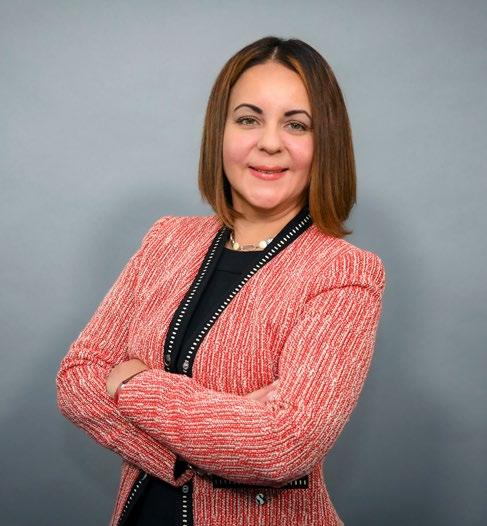
“I fell into human resources by accident,” Zouhbi explains. “I had to work my way through school, and hospitality industry gave me that flexibility to work and go to college.”
Zouhbi started in operations, worked her way into accounting, and eventually found herself in a role in HR. The daughter of two immigrants from Mexico, Zouhbi’s bilingual skills were particularly effective in the hospitality industry where so many Latinos are employed, especially in Southern California where she grew up.
Almost twenty-five years working in hospitality, she would support hotel transitions, roll out new corporate programs, work through a financial crisis (a particularly challenging time when Zouhbi had to conduct multiple layoffs), drive culture, develop
“Every experience I have had, I’ve learned something new and grown in different ways.”

I believe if you’re absent and your division is still able to run smoothly, you’re doing something right.”
training programs, and work on international projects for multiple organizations.
At this moment in her career, Zouhbi is also hoping to inspire and grow others. She recently joined Latinas Rising Up in HR, a network of professional Latinas focused on personal and professional growth in the HR space. While she’s always had a passion for development, Zouhbi focuses on the development of her team to ensure it operates efficiently and that each individual has the opportunity for growth.
“I believe if you’re absent and your division is still able to run smoothly, you’re doing something right,” Zouhbi says. “I want to equip my team with the development, resources, and empowerment to be their best selves and to grow into new roles. I have very candid conversations with my direct reports and what’s working and what needs to improve to get them where they want to be. That feedback was important for me, and I hope it’s benefiting them.”
Zouhbi’s perseverance and drive to keep growing over the last twenty-five years has helped her to achieve her goals and stay passionate in developing others to be the best they can be.
What is your secret to successful leadership?
The impressive executives featured here share theirs, and they are strategies that engage both the mind and the heart.
BY NOAH JOHNSON
Indrani Franchini shares Alnylam’s cultural journey and how she’s pushing the ball forward with an inclusive leadership style

EVP, Chief Legal Officer, and Corporate Secretary
Alnylam Pharmaceuticals
INDRANI FRANCHINI HAS SPENT HER career helping major companies transform their compliance programs. In 2017, she brought that expertise to Alexion Pharmaceuticals as it waded through an overhaul, a new plan for compliance, and regulatory pressures. She’s now the executive vice president, chief legal officer, and corporate secretary at Alnylam Pharmaceuticals.
“I believe chief legal officers and chief compliance officers are much more than just lawyers in an organization. They drive values and they drive how we do our work,” Franchini says. “At Alexion, I was able to impact the how, making sure that we were doing our work with integrity. It was much more than being a lawyer and just managing risks. It was about shaping the way we want to show up and how we want to be seen by our stakeholders.”
When AstraZeneca acquired Alexion, Franchini saw an opportunity to make a similar impact at Alnylam. It checked all
the boxes—it was a fast-growing biotech that was making a positive impact on patients through RNAi therapeutics. It was also managing a Department of Justice investigation and needed a strong leader to help chart a path forward for the company. In 2022 Franchini welcomed the challenge, which she describes as “a journey, not a destination.”
“Indrani is a fantastic lawyer and leader who supports Alnylam’s vision to harness the potential of RNAi therapeutics that transforms the lives of patients, as well as its commitment to diversity, equity, and inclusion,” says Bill Gaede, partner and global IP practice group leader at McDermott Will & Emery. “Her leadership and passion towards the company’s goals has been admirable.”
“I wouldn’t say we got it all solved, but we continue to make sure that how we do things is top of mind and that’s about understanding legal risks and the benefits you create through your legal approaches,” Franchini says. “It’s

about being very risk-aware rather than thinking in terms of being risk-averse; there’s always risk in regulated industries. I’ve been excited to help the organization talk about risk differently and start those conversations.”
So far, she has not only helped the company see a favorable outcome in the DOJ investigation but has focused on changing the way legal is viewed among its business colleagues. She

sets the tone for her team by being an inclusive leader. As someone who grew up with a biracial background and studied in different countries, she believes that having a diverse team “leads to more innovative outcomes,” she says.
“I like to create an environment where people feel like they can bring their whole selves to work. I want to enable that and for people to feel that level of openness in my organization,”
Franchini says. “That means championing communication, having forums that facilitate different types of dialogue and interaction.”
One of those forums has been Harmonia, a LatinX ERG at Alnylam. As an executive sponsor for the group, she aims to pour her life and career lessons back into others.
“I’ve been really lucky throughout my career to have different sponsors, people
There’s always some common ground, even in a challenging situation.”
who gave me advice and who looked out for me,” Franchini says. “I do think the path you take in your professional career is not always clear, so having people that you can talk to, bounce ideas off of, and who can tell you about their professional journey is really important. Things like ERGs are important ways for people to connect.”
Franchini is also excited about ways legal can use technologies, like AI, to become more efficient.
“We’re really embracing it as a legal team. I’m excited to be potentially using AI to generate contracts, to learn from our contracts, and to look at efficiencies in our work,” she says. “I think about twenty-five years ago as a junior lawyer and all the grunt work that I did because that was just what we did. But now, we can take people out of the inefficient, routine work.”
She adds: “I can bring my junior people into more substantive stuff quicker because
we’re embracing things that’ll give standard contracts to start with. At the same time, we’re staying on top of potential risks and have a team focused on that to be able to go in with eyes wide open.”
Franchini often tells individuals she’s mentoring about the importance of finding common ground.
“There’s always some common ground, even in a challenging situation. If you’re having a hard time getting someone to understand your perspective or why you’re bringing certain legal advice to the table, you have to find some reason for them to believe and to care,” Franchini says. “Sometimes that common ground isn’t always easy or apparent. In fact, you’re sometimes in situations where you feel like you can’t find anything you can connect on. But even when I’ve gone into a room where I am the only woman or person of color, I assume that there’s got to be some common ground.”

BY KEITH LORIA
Yanina de Vargas shares her journey to the US from Argentina and how she mentors the next generation of leaders
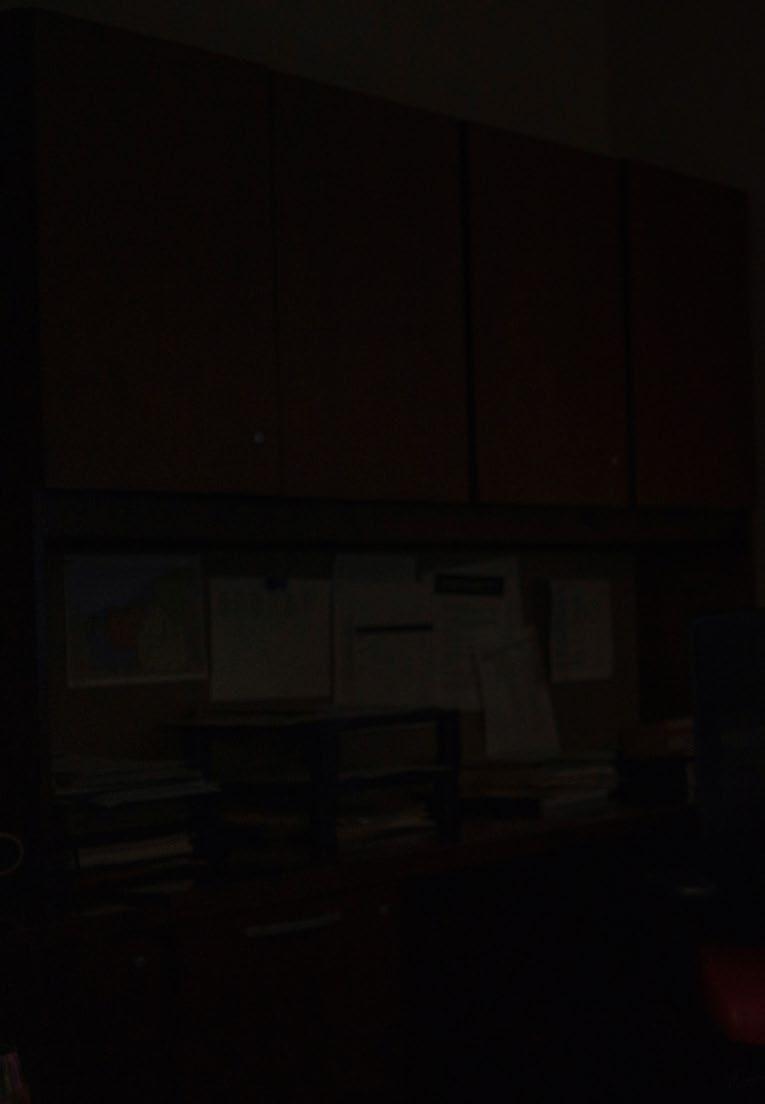

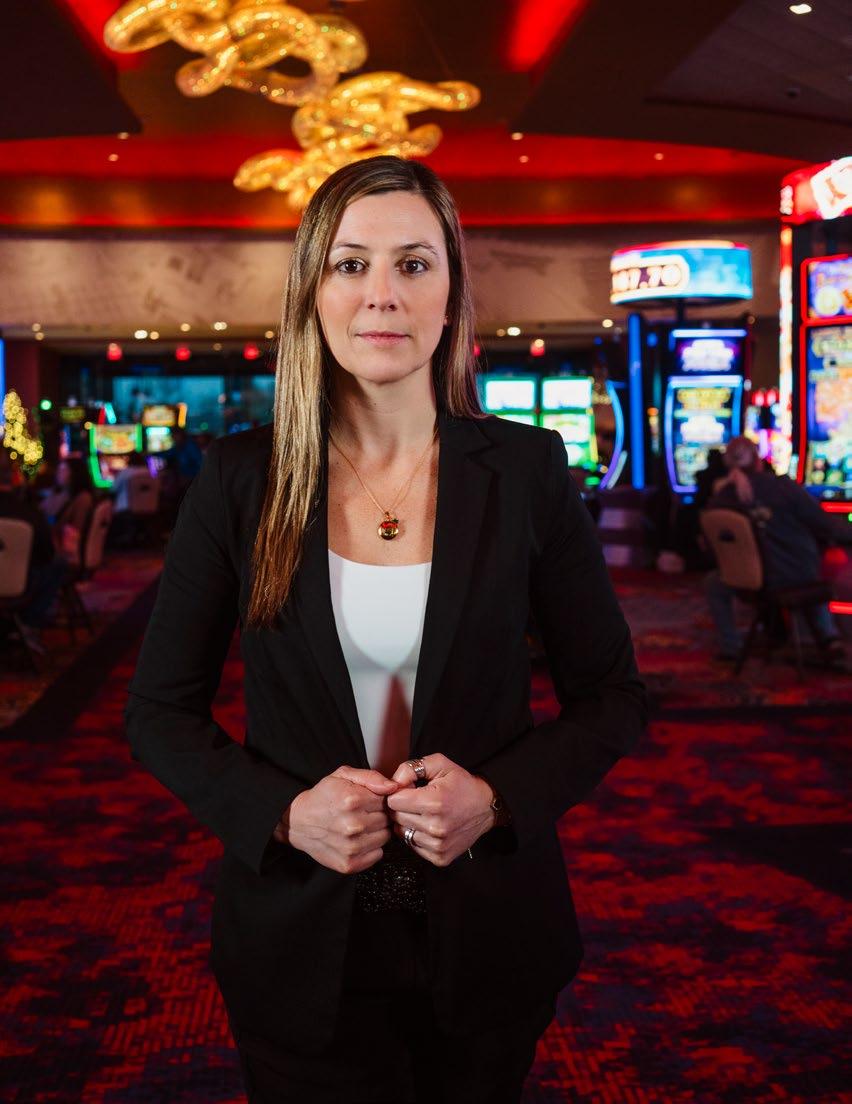
de Vargas first came to the US, she didn’t know English, and her degrees in accounting and business administration from Universidad Nacional de Mar del Plata carried little weight outside of her home country.
“I wanted to see the world and connect with people from different backgrounds. I left Argentina to travel and then figured I would go back and start my career path,” she recounts. “The US was my last stop in my travels before heading back to Argentina and once I was here, I ended up finding my passion. So I stayed.”
That passion was in the gaming industry, and she landed a job as an accountant at Caesars Entertainment Corporation, while earning another degree in accounting from Bellevue University.
“I was exposed to different types of businesses under one roof, as working at a casino property gives me exposure to food and beverage, entertainment, gaming, retail . . . there was lots for me to learn,” she shares.
Today de Vargas serves as vice president of finance for MGM Northfield Park, Ohio’s award-winning gaming, dining, and entertainment destination, located on the Northfield Park harness racing grounds.
De Vargas is from a very small town called Necochea, in the province of Buenos Aires, with a population of less than one hundred thousand people. Making it to an executive role in corporate America, in a large company such as MGM Resorts, is quite an accomplishment.
“Coming here and being able to adapt, learning the language, and being competitive in the workforce is probably my biggest achievement,” she says.
She knew from the beginning that if she was going to stay in the US, she wanted to rise to the top of her career and wasn’t going to “just sit in the corner.”
Her tenure with MGM Resorts began in 2015, when she took a job as its gaming audit and accounting manager. From there, she transferred to MGM National Harbor in the Washington, DC, area, where she helped open the complex and moved her way up to finance director.
“It was great to go from a behind-thescenes corporate role to an all-hands operations role at the property,” de Vargas says. “I was getting promotion after promotion. I was learning and growing, jumping into the pool for every opportunity and not being afraid of
Coming here and being able to adapt, learning the language, and being competitive in the workforce is probably my biggest achievement.”
trying. Now, I understand the business from all sides—corporate, behind the scenes, and everything dealing with the property. There’s never any time to be bored; there is always a new challenge that keeps you motivated.”
The Northfield Park opportunity came in 2020 with another promotion. Her responsibility in 2024 is strategic direction and oversight of the finance division, including financial planning and analysis, accounting, procurement, cage and count, warehouse, and lots more.
As part of her role, de Vargas leads a diverse team of around one hundred and sees herself as a personable leader who is there to provide guidance and help the team grow.
“I encourage different opinions and believe people should deliver on commitment.
I like having team members with different backgrounds; I think we can all learn from one another and challenge each other to get a better result,” de Vargas explains. “It helps to look at things from out of the box. Every time you look at something with fresh eyes, we all benefit.”
De Vargas also serves as a mentor to many—both those entering the industry and others looking to follow in her footsteps.
MGM Resorts is a big champion of mentorship, and de Vargas is always willing to help and encourage young leaders interested in the field, taking part annually in the company’s mentorship program.
MGM Resorts’ six-month mentorship program is designed to enhance knowledge, skills, and abilities through struc-
tured, self-directed learning. De Vargas is also a mentor within the supplier diversity mentorship program, which is an eightmonth program that provides guidance and resources for business development to minority-owned businesses and suppliers. She notes that MGM Resorts aims to put a total of 150 companies through the program by the end of 2025.
For her, being a good mentor comes down to being a good listener and motivating people to be their best so they can grow and improve. Her biggest piece of advice is to not be afraid to think differently.
De Vargas is also a member of MGM Resorts Hispanic employee networking group and an external women leadership group, both designed to help others succeed.
“I think it’s very important to understand what someone’s strengths are to place them in the right processes,” she shares. “It’s important to understand what team members like, what their goals are career-wise, and how they can best perform.”
Having lived in the US for fifteen years now, and being a mother of a young toddler, de Vargas is proud of all she has accomplished, but she still has bigger dreams.
“Career-wise, I think it’s important that I continue to learn and grow, be exposed to new things, and find new challenges. I would like to become a president,” she says. “Learning is an ongoing process; it never ends.”
Adam Building Company is pleased to congratulate Yanina de Vargas on being recognized for her hard work and exceptional accomplishments. All the recognition and accolades are well deserved.
Adam Building Company is a general contractor and construction management company that has attained extensive experience in virtually all aspects of the construction industry. They can provide pre-construction services, including assistance with land assembly, project entitlement, estimating and cost control, design, and bid preparation.
SERVICE OFFERINGS
General Contracting
Construction Management
Preconstruction & Development
After-Project Client Care
SPECIALIZING IN
Commercial Construction
Commercial O ce Buildings
Multi-Family Housing
Hospitality/Gaming
Automotive | Religious Institutions
Specialty Renovation/Alterations
4475 Renaissance Parkway
Warrensville Heights, Ohio 44128
216/831-3131
info@adambuilding.net adambuilding.net

Yanina de Vargas for being recognized by Hispanic Executive Magazine.
Your commitment to excellence and your support of an inclusive and diverse workplace make us proud.
mgmresorts.com/gamesense
BY BILLY YOST
Brenda L. Sanchez-Pineda reflects on the lessons and leadership that have helped her—and in turn others—grow as an HR leader
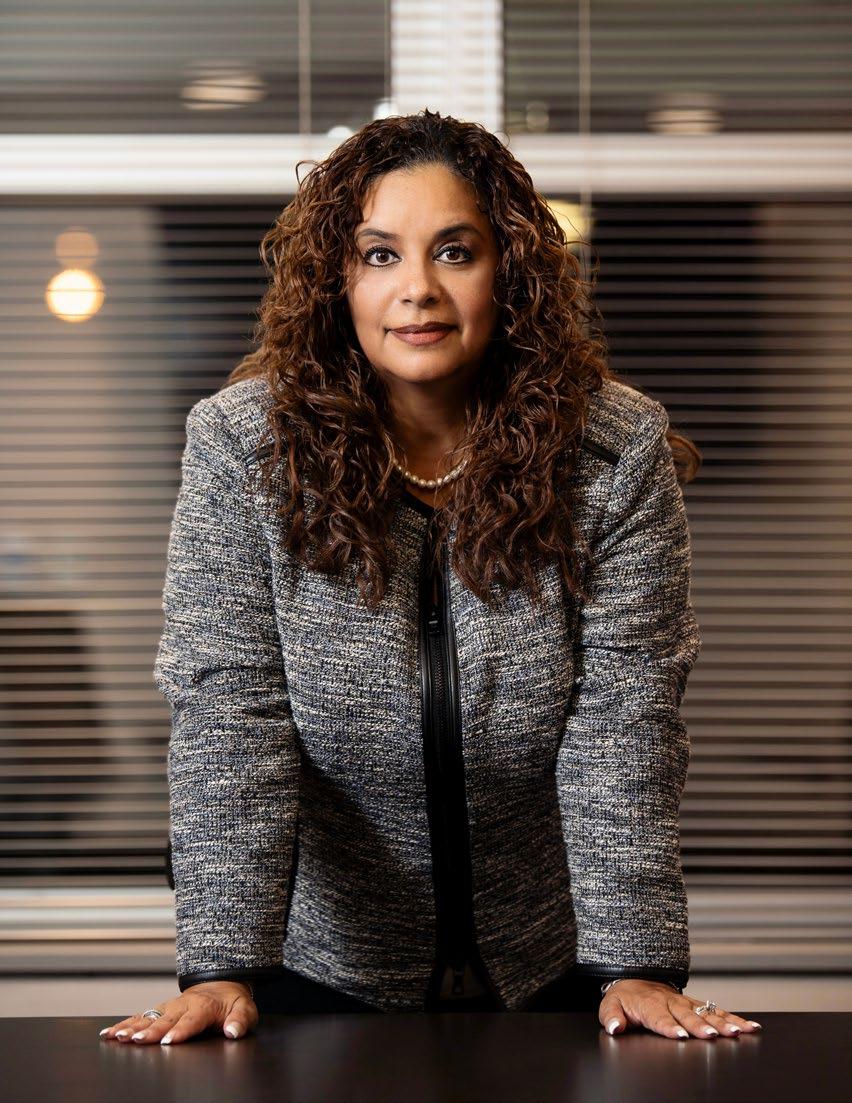
BRENDA L. SANCHEZ-PINEDA WILL never forget her first true introduction to courageous leadership. After the murder of George Floyd in 2020, Sanchez-Pineda saw the suffering around her. In an effort to bring support and empathy to those near her, then-HR director Sanchez-Pineda met with her CEO Bob Weinstein at Robertet North America. The conversation was not an easy one, and she left unsure of what could be expected in the coming days.
“Three days later, our CEO sent an email sharing a personal story and his strong aversion to racism and optimism for change,” remembers Sanchez-Pineda, who is now senior director of human resources for North America. “I was profoundly moved. I knew I had played a role in his choice to share such a significant narrative with our employees, and I was so impressed with our CEO’s courage and empathy for people who were hurting.”
It was a landmark moment for Sanchez-Pineda, but the senior director has been inspiring those around her for decades. She was able to grow from an administrative
assistant role into an HR manager at Avon. She had been serving in an admin role for five years while attending undergrad, and her colleagues had the chance to see a Latina evolving into a new opportunity and leading others in the process.
“I think I gave hope to other admins that they could indeed move up,” SanchezPineda says. “And I had the opportunity to be exposed to many great leaders as well. So many of those women may not know it, but they served as role models for me and other women in the organization.”
Early in her leadership experience, Sanchez-Pineda did her best to stay out of the spotlight. Others had mentioned the commanding presence with which she carried herself—she had even been mistaken for a lawyer during a presentation. But she knew that that presence could carry with it a fair amount of baggage when it came to helping other people open up to her and share their struggles.
If she could change anything, SanchezPineda says she would go back and give herself some grace. That commanding presence didn’t need to be “toned down.” It just needed to be tailored to the right moments: speaking out, taking the initiative, establishing early partnerships, and not being afraid to lead.
Sanchez-Pineda has been able to become the mentor she saw in others earlier in her career. She helped create a mentorship program in partnership with a network of Latina HR professionals, Latinas Rising Up in HR, and she was a contributing author for Latinas Rising Up in HR, Vol. II and the recipient of 2023 Leadership Award.
“I aim to establish mentorship programs that are unfiltered, candid, and ready to equip young women for the demanding hurdles that life and careers may throw in your way,” Sanchez-Pineda says. “I believe many lack the level of intensity and direct-

ness that resembles tough love. My goal is to continue to serve as a mentor that will leave participants with unforgettable experiences, where they emerge tougher, and free from any lingering fears or self-doubt.”
At Robertet, Sanchez-Pineda is especially proud of the diversity program she has taken the lead on, initially starting out as a discussion around women in supply chain organizations in 2019, which quickly evolved as the company doubled down on its diversity, equity, and inclusion (DEI) efforts.
“I think it’s important to point out that these conversations were happening before George Floyd’s murder, as we began a three-year strategy that included training, diversified recruitment processes, advancement opportunities, and pay equity,” the senior director explains. “I am now working on a global scale with our HQ in France to design a DEI plan for our international affiliates.”
Sanchez-Pineda’s growth and evolution, at least initially, can be traced back to the single mother who raised her. It’s no surprise that the HR leader describes her mother as strong and motivational, two qualities she undoubtedly passed on to her child.
Sanchez-Pineda’s mother now lives with her, and in many ways, the roles have been reversed. And Sanchez-Pineda is grateful for the way things have played out.
Every Sunday morning, you can find Sanchez-Pineda up two hours before the rest of those in her home, sitting with a cup of freshly brewed Café Bustelo staring at the mountains out her window.
“Most of the time, I just sit in silence and reflect on the blessings in my life and feel grateful for the opportunity to share them with my family,” Sanchez-Pineda says. The senior director has grown so much over the course of her career, but she’ll never forget how far she’s come, and how much more she has to go.
“I aim to establish mentorship programs that are unfiltered, candid, and ready to equip young women for the demanding hurdles that life and careers may throw in your way.”
BY CLAIRE REDDEN
As the vice president of financial planning and analysis at Verizon Business, Samantha Moctezuma draws on her fifteen years of experience to build community for other women in finance
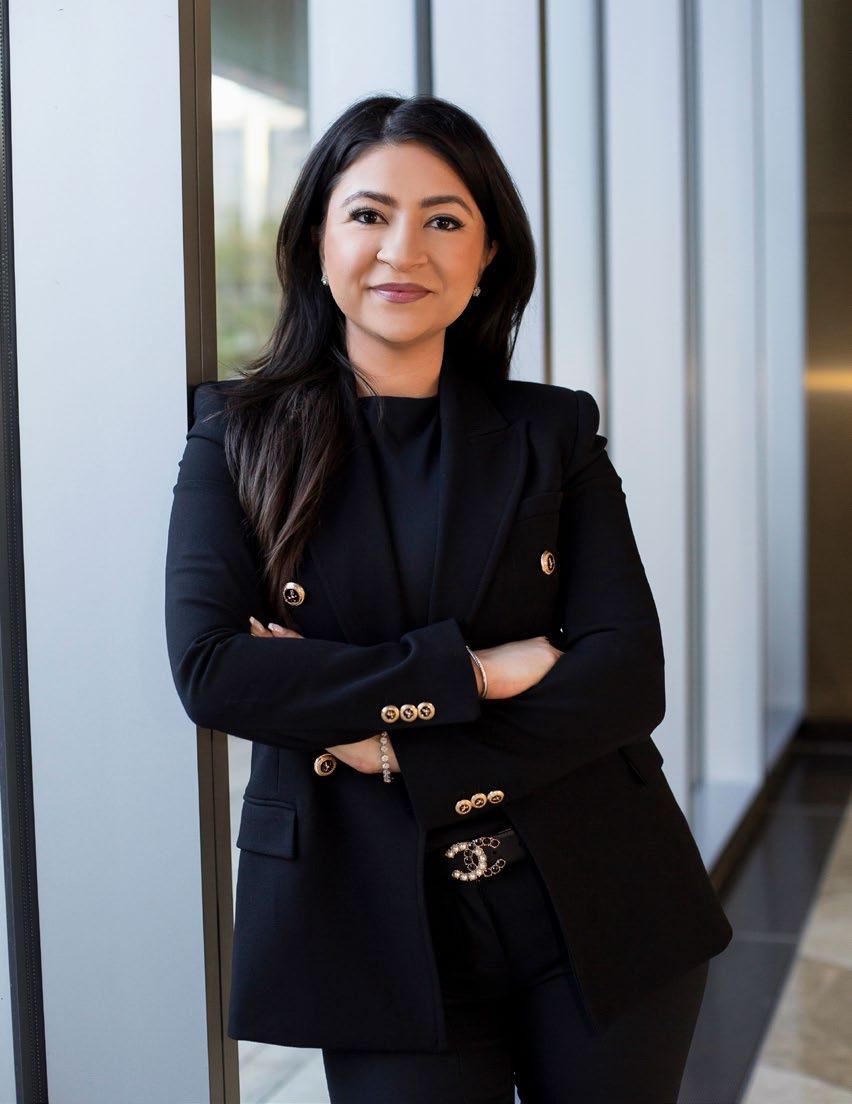
Samantha Moctezuma VP of Financial Planning & Analysis
SAMANTHA MOCTEZUMA SAYS HER parents emphasized the value of education from childhood. They worked hard to send her sister and her to a private school, which she says set her up for success. She’s the first person in her family to graduate from college.
“My parents started a family very young. Their focus was on building careers for themselves rather than school, just to be sure that they could provide a better lifestyle for my sister and me,” Moctezuma says. “They’ve always been my greatest support system and encouraged me while I worked to navigate that entire [college] experience.”
Yet it didn’t quite turn out as expected. Moctezuma began her college experience studying to become a dermatologist, only to realize that her true passion was in finance. With that knowledge, she applied for a summer internship—at Verizon.
“I grew up in a Verizon household before it was even called Verizon. My father started
as a field associate technician and my mother was a customer service rep,” Moctezuma says. “I grew up knowing that Verizon was a company that would provide what I needed for a rewarding career.”
As an intern, Moctezuma gained a network of people who welcomed her and encouraged her development. “They nurtured me in a different way than I ever imagined,” she says. Fifteen years later, Moctezuma is still at Verizon, having built her career there. Today, she serves Verizon Business as the vice president of financial planning and analysis, leading a team of over two hundred finance professionals and reporting directly to the CFO of Verizon Business.
“I can’t believe it’s already been fifteen years,” Moctezuma says. “At the same time, it’s not surprising. I’ve been able to build skills and gain knowledge here that most people would have to jump from one company to another to gain. I’ve been able to drive cost
efficiencies, work on acquisitions, commercial decisioning, transformation execution, and lead capital and profit and loss planning. And Verizon has supported me every step of the way, including covering my tuition while I earned my master’s in accounting.”
However, that’s not the only reason she’s stayed. “More importantly, what keeps me here is the people,” Moctezuma says. “The relationships built from early on in my career and throughout are what’s special here. It’s all molded me to be the effective leader and impactful decision-maker I am today.”
Today, her mission is to continue building and providing that community of people for others at Verizon—and especially for women in finance.
“From time to time, I’ll meet someone who mentions how I’ve inspired them. That leads me to take a step back and realize that I have a responsibility to share my experiences and knowledge, as a working mother,
Every journey is different, but if you can find common themes and fill the tool kit with the tools to succeed, then that just shows we’re making a dent.”
as a Hispanic woman, as a first-generation college graduate,” she says. “I’ve had amazing mentors and sponsors. It’s my turn to pay that forward. I need to be able to create that same path for other women in the business.”
Moctezuma sees it as her duty to make space and be the representation for other women. As part of this, she and her colleagues built Verizon’s Women in Finance group, which Moctezuma still sponsors today.
“Understanding if [the women in the group] feel like they know how to navigate their career was a great starting point,” Moctezuma says. “Every journey is different, but if you can find common themes and fill the tool kit with the tools to succeed, then that just shows we’re making a dent.”
When it comes to offering advice for that tool kit, Moctezuma divides it into two: the personal and the professional.
When it comes to the personal, Moctezuma says she feels particularly lucky.
“I’m fortunate to have an amazingly supportive family. My husband is my biggest champion, and that’s really important to me. We’re both working parents, and we’re very honest with one another about that. Whenever either of us is considering a career move, we discuss together what it would mean. For example, if I’m taking on a new role, can he take on more at home for a few months while I get up to speed? And vice versa. Having those conversations is key,” she explains.
“From a professional standpoint, remember to bet on yourself and be intentional about the roles you take,” Moctezuma says. “Not only should it be about helping the company, but it should also be about gaining a new network, a new skill, or meeting your career objectives. And if you do take on a new role or project, always remember that you’re in the room for a reason.”
50. Joel Silva, Vallarta Supermarkets
58. Philip Catron, NaturaLawn of America
66. Josh Smith, Veteran Benefits Guide
72. Juliana Londoño, Juliana Londoño LLC
76. Harold Castro, Walmart




In every industry, Latinos are not only excelling, but they are also helping shape the American dream. These five executives share their accomplishments and legacies that they are building.
Joel Silva brings his financial expertise to guide Vallarta Supermarkets as it expands into new communities




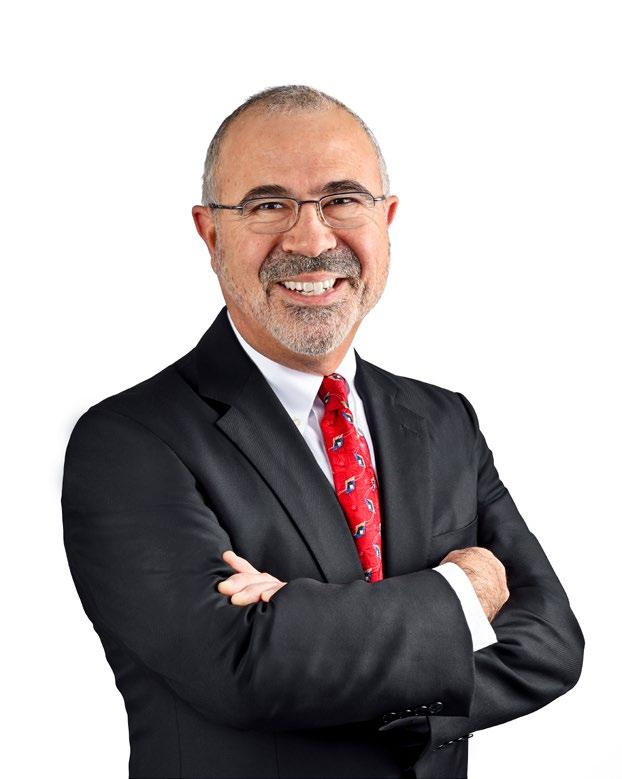
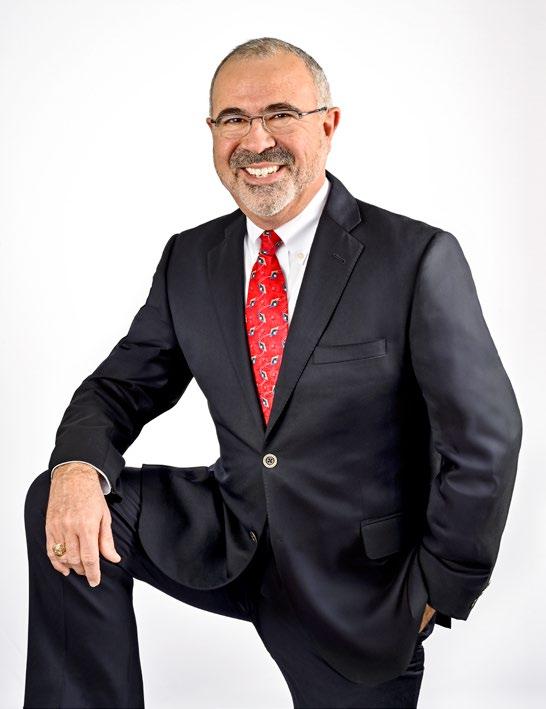







Joel Silva knew the challenges that can come with trying to lead within a family-owned-and-operated business.
“Too often, a family business is structured so that the family uses it as a way to employ other family members irrespective of their experience,” Silva says. “It can be frustrating because you may end up reporting to or supervising someone without the necessary qualifications and experience. Vallarta is not like that at all.”

In fact, what Silva saw when interviewing for the role in 2022 was exactly the opposite. The financial executive saw a family-run organization where, regardless of their familial connection to the business, family members have paid their dues pushing a broom, running a cash register, and otherwise grown into the company from the bottom up. Anyone in the family who has attained a higher role in the organization knows exactly what it means to be on the front lines of customer service.

Vallarta—which started as a single Van Nuys, California, meat market founded by Mexican immigrant sons in 1985—has blossomed into a grocery chain of fifty-six stores and counting. Silva was hired to help bring the business into a new era of expansion and prosperity, while also staying true to what made Vallarta great in the first place.
Silva hit the ground running, implementing a new Microsoft Dynamics 365 ERP that went live in October 2023. The process, a massive undertaking for any organization, was completed in six months. On the heels of that success, the finance team upgraded its financial planning and analysis software along with hiring a new director to oversee it. At the time of speaking in late December 2023, Silva expected that software to go live in early 2024.

At present, Silva is most focused on the main reason he was hired: expand the current footprint by quickly opening new and profitable stores.


Joel Silva mentioned his network repeatedly during his interview with Hispanic Executive. It’s one he tapped to find his job at Vallarta, and he returns to it often when seeking new talent, partners, and opportunities. The Vallarta CFO has great insight into the importance of building that network and being available for those seeking help or advice.
“I had a mentor early on that taught me the value of networking and maintaining that network,” Silva explains. “You have to understand that it’s a two-way street. You also have to have something to offer. Make yourself available and be there for others, and they will be there for you. I respond to every call, every email, and do my best to help. It takes years to develop, but you will always be grateful that you’ve taken the time to build those relationships.”
“Vallarta had only opened one store in the previous three years, and so the leadership here made it very clear during the interview process that we were intent on increasing that number significantly over the next three years,” explains Silva, who last spoke with Hispanic Executive in 2021. “They wanted someone who could wrap some discipline around that process; I’ve also been able to implement financial modeling and overall structure around the process of evaluating and selecting new store locations.”
The location of Vallarta’s new stores is about more than just their profit-driving potential. It’s about how much positive change the organization can bring to the neighborhoods and communities in which it operates. Department heads lead new stores, but virtually everyone else hired for the store is from the local community.
“We’re talking about 150 new jobs at a minimum for each new store,” Silva explains. “And because we’re growing, every new store opening means a head of a department gets the chance for promotion for maybe a larger department, or even an assistant director or store director position. The way that we run our stores takes years to learn, and so we take the internal development of our talent very seriously.”
Silva says that at the corporate level of the organization, turnover is incredibly low, a result of that focus on development and promotion from within. Vallarta is a place where a shelf-stocker or a cashier can build a long and lasting career if they want it, with mentorship along the way.
The CFO has made his own impact when it comes to mentorship, building out an internship program within the finance function in partnership with nearby California Lutheran University. Silva knew the dean of the business school, and after running into them at a panel discussion, the two curated an internship program that was up and running in only six weeks.
“It was just a spontaneous idea I had, and all of a sudden I had my first intern here,” Silva says, laughing. “I’d like to expand it to other schools, particularly ones that sit within our footprint so we can demonstrate just how much that collaboration can make the community a better place.”
“THE WAY THAT WE RUN OUR STORES TAKES YEARS TO LEARN, AND SO WE TAKE THE INTERNAL DEVELOPMENT OF OUR TALENT VERY SERIOUSLY.”


For more than 95 years, we’ve been a trusted insurance, risk management and consulting partner for businesses, communities and people around the globe. Customizing programs and solutions tailored to your needs.





In 2022 alone, Vallarta Supermarkets also awarded $240,000 in higher education scholarships for full-time and part-time employees and their dependents. The grocery chain is also a vocal supporter of the Children’s Miracle Network, Aisles of Smiles, the Muscular Dystrophy Association, and a variety of nonprofit causes through its Gonzalez Family Foundation.
“We’re Angelenos ourselves, so we understand how powerful relationships are to helping local, family-owned, homegrown companies like Vallarta thrive,” says Paul Branks, senior vice president and manager of downtown Los Angeles commercial banking center at East West Bank. “We’re excited about helping them continue to grow their business, manage their cash flow, and maximize their operational efficiencies so they can reach further and connect to new opportunities.”
Silva came to Vallarta to help a family-owned business continue to expand and bring jobs, development, and opportunities to communities across California. Silva’s ready to build big, build smart, and celebrate nearly forty years of supermarket innovation.








Congratulations to Joel Silva for his exceptional leadership in supporting the strategic growth of Vallarta Supermarkets. East West Bank has worked to build stronger communities for more than 50 years and we are honored to service Vallarta Supermarkets, where generations come together to celebrate traditions and create lasting memories. Working together, we can all Reach Further.

With a passion for environmentally friendly lawn care, Philip Catron founded NaturaLawn of America and created his own American Dream




Philip Catron Founder and CEO NaturaLawn of America







Philip Catron just needed someone to believe in him.
“After starting a small business when I got out grad school, I was recruited by a national company (the now-defunct ChemLawn) and helped develop their operations up and down the East Coast for them,” says Catron, who studied plant science as an undergraduate at the University of Delaware and plant physiology and genetics as a graduate student at Rutgers University. “During that time, during the mid-’70s to mid-’80s, a couple of things became very obvious to me.”

The first was that the chemicals being used by technicians were causing problems such as skin rashes and organophosphate poisoning—a lowering of an enzyme in the blood that can cause muscle twitching and a host of very serious nerve problems.
“We were getting various complaints from consumers about their pets being sick after an application to the lawn and in some cases, they died ,” Catron says. “Golden retrievers are especially susceptible to a herbicide product called 2,4-D, which a lot of lawn care companies still
use today. So, I took a stand in 1978 and developed a different program than what ChemLawn was using and presented it to them.”
The program included an emphasis on integrated pest management (IPM), where you concentrated on the cause of the problem and not just simply treat the symptom. The Federal EPA even asked Catron to write the chapter on IPM in 1991 because of his expertise.

His message to ChemLawn was clear: things needed to change in the mode of operation and the products that were being used. But the decision-makers at the company weren’t interested and asked him to kill the program.

“Unbeknownst to them, I kept it running at one of my branches in Virginia Beach, and it was very successful,” Catron says. “When my boss came out and found out, he insisted that I stop.”
With ChemLawn’s careless decision, he was ready to go elsewhere and was recruited by a small regional company.


“I knew I could make this happen,” he says. “I didn’t kill the idea but kept studying it on my own and collecting concepts.”



What interested you about NaturaLawn?
There are three reasons why I decided to be part of the NaturaLawn family:
• Proven in time—over thirty years successfully providing organic-based lawncare services
• Proprietary products that are exclusive to NaturaLawn
• A team at home office that is committed to your overall success
During my early conversations with the team, I saw a commitment to environmentally friendly practices like no other in the industry. This aligned perfectly to my values and vision of reducing the amount of pesticides going into the environment.

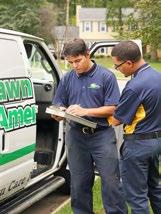
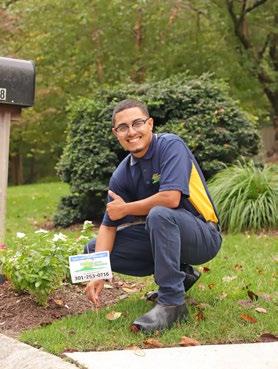
But his new company was consolidating and getting ready to sell, so Catron lost his job less than a year after starting—his idea was again without a home.
With two young children, Catron wasn’t sure what was next. He remembers standing in line at the unemployment office and knew he needed to get someone to listen to his idea. He started going out and talking with those in the industry about his concept to convert them from chemical lawn care to a more organicbased biological concept.
But no one was convinced. “I must have been a very bad salesman,” he says with a laugh. So, Catron decided to start his own company in 1986, and NaturaLawn of America was born, originally operating out of his house in Damascus, Maryland.
By 1988, the company developed its first franchise document and, a year later, sold its first franchise in York, Pennsylvania, which is still operating today.
“In 1989, we introduced beneficial microbes into our proprietary fertilizer and even today, that concept is still very new to the industry—they’ve heard of it but don’t truly embrace it,” he explains. “From that one single strain to where we are in 2024, we now have over eighty different beneficial microbe strains in our fertilizers, we have reduced the use of chemical pesticides by over 90 percent in our applications; this undoubtedly has had a huge beneficial impact on the environment.”
Today, NaturaLawn has 100 licenses across 27 states and treats more than 125,000 customers in the US.
“We created a niche, and the industry has somewhat tried to follow us, but they’re very slow in adapting to this new way of conducting a safer lawn care system. They are not doing a very good job,” Catron notes. “We’ve been growing at double digits every year since our inception, and we will do a little more than $105 million this year.”
“MY FAMILY HAS ALWAYS COME FIRST, NOT THE BUSINESS. WE TEACH THAT, SUPPORT THAT, AND ENCOURAGE THAT AT THE COMPANY.”
The philosophy behind the company’s success is simple: “If you learn to take care of your people first, they will take care of the customers and then they will take care of the business by buying your services and products,” Catron shares. “If you worry too much and all you’re geared towards is making profits, you may succeed for a short period of time, but it won’t last.”
To say he reached the American dream is an understatement. Catron’s father grew up on a farm in Southwestern Virginia, and it’s there that he first learned about agriculture, plowing a field with a mule, shucking corn, and feeding the chickens. He even lived without running water and used an outhouse.
“People think [those] are hardships—and in many respects, they are, but they teach wonderful ethics, and you become very appreciative of what you have,” Catron explains.
His first real job was raking sand traps and working the greens at a golf club. He continued finding jobs with landscapers and at country clubs, so he’s always had a love for the industry.
“I’ve always liked working outside and always enjoyed watching things grow,” he shares. “You learn the magnificence of nature when you get on your hands and knees and start digging into the grass and

soil and see how much life is there. People just take it for granted.”
Now, thirty-five years after he first founded NaturaLawn, Catron has an even deeper appreciation for lawn care and is proud to operate a family-run company with leadership driven by his children, Theresa Smith and Jesse Catron, both of whom are senior vice presidents.
“My family has always come first, not the business,” he says. “We teach that, support that, and encourage that at the company.”
But that doesn’t mean you need to be an immediate family member to be part of NaturaLawn—which has employees from all over, including Honduras and El Salvador— and he encourages those from Central America to get involved in this career.
The company is always seeking new franchisees who care about the environment
like his family does. By franchising with the company, Catron believes others can follow in his footsteps and achieve the American dream.
One of the things that is unique at NaturaLawn is that it offers ownership to every employee across the system every year they are employed—for every year they are employed, they achieve a $5,000 discount/ credit toward the purchase of a franchise up to $20,000. With a franchise costing $29,500, that’s most of the cost.
“We’ll even help finance the deal,” Catron says. “It’s a way to attract good people, it’s a way for us to identify people so we’re promoting from within those who believe in the system. And for our independent franchise owners, it’s a great way for them to recruit people.”
Catron hopes to continue to get the word out about the company and make the world a more environmentally friendly place.
By Diego Antonio, Franchise Owner, NaturaLawn
Becoming a franchisee can be a rewarding venture, and here are some of my general pieces of advice for anyone interested in becoming a franchisee, whether it’s with NaturaLawn or another franchise.
RESEARCH THE INDUSTRY. Understand the industry you are entering, including market trends, competition, and potential challenges. This knowledge will help you make informed decisions and navigate the business landscape more effectively.
EVALUATE YOUR SKILLS AND INTERESTS. Consider your skills, interests, and passions. Choose a franchise that aligns with your strengths and personal preferences. This will contribute to your overall satisfaction and success as a franchisee.
BE PREPARED WITH YOUR FINANCES. Assess your financial situation and be realistic about your investment capabilities. Franchises often require an initial investment, ongoing fees, and operational costs. Ensure that you have the financial resources to sustain and grow the business.
UNDERSTAND THE FRANCHISE MODEL. Familiarize yourself with the franchise model, including the franchisor-franchisee relationship, support systems, and training programs. Look for a franchise that provides comprehensive support and training to set you up for success.
UNDERSTAND LEGAL AND CONTRACTUAL ASPECTS. Seek legal advice to fully understand the terms and conditions of the franchise agreement. Pay attention to any restrictions, obligations, and rights outlined in the contract. Clarity on these aspects is crucial for a successful partnership.
KNOW THE CULTURE. If you’re considering a franchise in a different cultural context, like NaturaLawn, it’s important to be culturally aware. Understand the local market, customer preferences, and any cultural nuances that may impact your business.
NETWORK AND FIND MENTORS. Connect with other franchisees within the brand or industry. Networking can provide valuable insights and support. Consider seeking a mentor who has experience in franchising and can guide you through the challenges.
BE ADAPTABLE. Be prepared to adapt to changing market conditions and consumer preferences. Flexibility and the ability to innovate are essential for long-term success in the competitive franchise landscape.
ENGAGE WITH THE COMMUNITY. Build strong relationships within the local community. Engage with customers, participate in local events, and contribute to community initiatives. This can enhance your brand presence and customer loyalty.
CONTINUOUSLY LEARN. Stay informed about industry trends, business management practices, and any updates from the franchisor. Continuous learning is key to staying competitive and evolving with the market. Before making any decisions, it’s advisable to specifically research NaturaLawn and its specific requirements, support systems, and franchisee success stories. Additionally, consult with financial and legal professionals to ensure you make well-informed decisions.
An inside look at how veteran Josh Smith helps other service members fight for the disability benefits they earned










His friend was buying up vacant land in San Diego. It seemed like a great opportunity, and the friend mentored Smith as he tried to secure a loan. To do so, Smith would need support from the people around him.
When he asked his father-in-law for help, he received what would be life-changing advice: “Invest in something you know well.”
The advice upended Smith’s plan. What did he know well? Smith grew up in California and spent his summers in Mexico. He had learned Arabic while serving in the US Marine Corps from 1998 to 2004. After he finished his service, he worked at the Home Depot before spending eight years with the US Department of Veterans Affairs (VA), where he eventually worked as a rater.

While at the VA, as Smith assigned disability ratings and compensation amounts to his fellow veterans, he became an expert not only in how the system worked but also in its flaws. Smith’s background and experience put him in a unique position to help veterans. He pivoted from real estate and decided to start Veteran Benefits Guide (VBG). VBG exists to help veterans navigate the
VA’s disability claims process and receive the full benefits they have earned.
Today, nearly nine years later, VBG has assisted over thirty-five thousand veterans by providing them with a combined increase of $5.5 billion in lifetime benefits they would not have otherwise received. Veterans who work with the organization are each assigned a case manager and are charged a one-time fee only if they receive an increase in their benefits.

When he worked as a rater in the VA disability claims system, Smith felt powerless to change a large bureaucracy whose substantial claims backlog left veterans waiting years for a decision—only to receive low disability ratings or even be wrongfully denied benefits entirely. “No one at the VA seemed to care about what was happening, but I saw how broken the system seemed and was compelled to take action myself,” he says.

Smith originally intended to run a small operation to provide for his wife and three daughters. However, demand for the services was higher than he expected, and he soon realized the enormity of the problem that VBG addresses. “What




“THIS IS ABOUT MORE THAN BUSINESS. IT’S ABOUT THE GRATITUDE AND THANKS WE GET TO SHARE WITH THESE HEROES.”
started as a small business turned into a duty and a responsibility,” Smith says. “We’re motivated to provide this help to as many veterans as possible.”
Before the birth of VBG, veterans had little recourse to appeal VA decisions. They often worked with expensive lawyers and well-intended Veteran Service Organizations (VSOs) that lacked Smith’s specific expertise and experience.
That experience has helped Smith relate to veterans and organize his company accordingly. As a VA rater, Smith would make it a point to personally call veterans to sympathize with their unique struggles. This brought about a deep sense of empathy, heightening Smith’s motivation to advocate for unassisted veterans navigating this system.
The empathy that Smith feels for veterans was born out of his experiences growing up biracial and the experience of bridging between different countries, languages, and culture. Smith was born to a white father and a Mexican mother, and he often felt like an outsider in his hometown of Salinas, California, and during summer trips to San Felipe. Although he grew to cherish learning Spanish and enjoying amazing street food with his Hispanic cousins when visiting them, he was always “Josh Smith.” The cousins joked that he was brown on the inside but white on the outside.
The racial banter only increased in the military where some Hispanics wouldn’t accept him while non-Hispanics gave him a pejorative nickname based on his brown skin. These experiences with racial issues led Smith to establish a strong culture of respect within
VBG; his staff and its management team include many individuals of different races and ethnicities. Smith says that his background has shaped his desire to serve others and help those who are treated unfairly or in need of friendly, understanding assistance.
As an Arabic linguist in the Marine Corps Intelligence Division, Smith was first stationed at the Defense Language Institute in Monterey, California. Next, he was sent to Oahu, Kaneohe Bay, for the final three years of his service. When the events of 9/11 occurred, Smith was asked to use his Arabic in a wartime context for the first time. He prepared in Japan before spending five months translating in Iraq.
Today, while more veterans are aware of VBG, Smith often hears criticism of the private benefits service industry from some VSOs, who argue that veterans shouldn’t have to pay for a service that they could otherwise receive for free. Smith points out that veterans are already paying by not receiving the full benefits they have earned and not receiving their benefits in a timely manner.
Less than a decade in, Smith and VBG are going strong and remain motivated by results as veterans who have been fighting the VA for years finally receive the proper benefits they’ve earned through their military service. He recalls one veteran crediting VBG with saving his home from foreclosure. Others have been able to use their increased benefits to buy vehicles and even adopt children.
“We are changing lives,” Smith says. “This is about more than business. It’s about the gratitude and thanks we get to share with these heroes.”

Therapist Juliana Londoño aims to break barriers preventing Latino and BIPOC communities from accessing mental health services










who started her own business to focus on the intersectionality of mental health and the Latino/BIPOC communities.
But decades ago, she didn’t know that it was possible.


Growing up as the product of a singleparent household in Paterson, New Jersey, she had never seen a therapist, didn’t know she could pursue the profession, and didn’t get exposed to psychology until college. Even as a graduate student, she was unsure whether she belonged in the field.
“I’d look around my classrooms to find classmates and professors who didn’t look like me. I felt very isolated and in my own bubble given my experience with immigration, as a first-generation college grad, and growing up as an only child raised by an incredible single mother,” the entrepreneur reflects. “It definitely felt like I wasn’t meant to be there. Many times, I wanted to run in the opposite direction.”
She needed to remind herself that she belonged, and a quote stuck with her: “You may be first, but you won’t be the last.”
“That’s what got me through,” she says. “It was a matter of getting to the finish line and creating a ladder for generations to come.”
Since then, Londoño has grown into the kind of mental health professional she didn’t have exposure to growing up. As the founder and CEO of Juliana Londoño LLC, she aims to raise awareness, provide resources, and develop connections through workshops, trainings, and speaking engagements in diverse settings.




She’s outspoken on the barriers Latinos face as it relates to mental healthcare, hoping her voice can be a catalyst for change. One challenge is a lack of Spanish-speaking mental health professionals in the US, a factor the American Psychological Association says limits access to care. Londoño says that isn’t the only thing that might deter Latinos from getting the help they need.

Her business aims to fill that Spanishspeaking gap, but the challenge is the legal and regulatory considerations. “It’s very challenging when I get calls and requests

“YOU MIGHT BE THE ONLY BROWN PERSON THAT SPEAKS ANOTHER LANGUAGE IN THOSE ENVIRONMENTS, BUT EMBRACE THAT AND PUSH THROUGH.”
from folks in California, Texas, and Florida, and I clinically cannot meet with them since they’re in another state,” she says.
Then, there is the factor that insurance and managed care are a business. “While I’d like to think it’s patient first or client first, it’s often profit first,” Londoño says. “They have the power to say you have health insurance, but you have to pay out of pocket for mental health services.
“I hope to create awareness that there’s so much work to be done in these areas,” she adds, “because the few of us that do speak Spanish and want to help these communities are faced with these roadblocks and are prevented from having even greater reach.”
While it’s often hard to be optimistic when considering those challenges, she’s encouraged by her work as a mental health therapist at Wholehearted Healing Collective. The group provides an array of services including traditional counseling, support groups, and
community-based offerings. Recently, she’s been helping her young clients navigate life at school post-pandemic and helping clients of all ages unpack trauma from the pandemic.
“We all experience trauma with COVID, and researchers are still gathering data on what trauma looked like on a global scale,” she says. “What we know is that it’ll be a textbook on its own.”
Londoño describes the journey she goes on with her clients in those areas to “planting a seed.”
“The client waters that seed when they leave the office, and we check back in with that seed when they’re in therapy,” she explains. “Slowly but surely it starts to bud and next thing you know, you get a flower and we’re on to the next seed.”
Londoño has advice for aspiring Latino mental health professionals who find themselves feeling as isolated as she did on her road to success. They should understand that there
will be difficult times, but they need to remember that they earned the right to be there.
“You might be the only brown person that speaks another language in those environments, but embrace that and push through,” she says. “There also will be a lot of clinical hours you need to complete, and many of them might not be paid. But as you work through them, know your worth and that there’s a finish line.”
Once those professionals cross it and successfully enter the mental health field, Londoño admits that the challenges won’t stop there. That’s why they should focus on always being their authentic selves.
“Remind yourself that you’re human first and a therapist second or third,” she advises. “I make mistakes, I mess up, I break stuff, I’m good at some things and not others. But I’m going to show up and bring everything I am and that allows me to connect with others.”
A first-generation college graduate who found a path in finance and accounting, Harold Castro measures success in happiness and balance rather than in dollars and titles




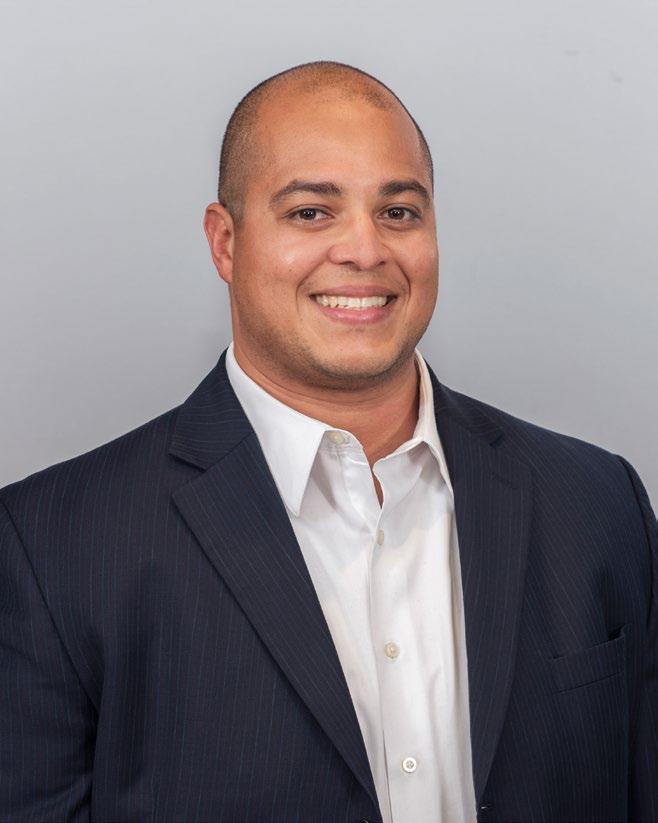
Harold Castro Director of International Controllership





Looking for opportunity and a better education for their children, his parents moved to Puerto Rico.
“Puerto Rico had very good English classes in terms of writing in the public school system. Not so much speaking, though,” says Castro, who is currently the director of international controllership at Walmart.
The family moved to the US when Castro entered high school, settling in Central Islip on Long Island. “It was a shock to the system. Obviously, there were some Puerto Ricans and Dominicans, but I didn’t know English. I could write it very well, but I couldn’t speak it,” he says. “I was called every other slur by fellow Latinos in New York. I wasn’t the classic New York Puerto Rican or Dominican.”

Outgoing and social, Castro quickly learned English in a “rough” high school with its share of gang activity. “It wasn’t the Hamptons, I’ll say that,” Castro says. With a dream of earning his pilot’s license, Castro
enrolled in vocational school and studied aviation. By his senior year, he was flying solo.
The lift beneath his dreams of earning a living in aviation dissipated, however, when he learned flight instructors were paid minimum wage. He enrolled in Dowling College on Long Island and studied finance and accounting, which weren’t discussed at his low-income high school.



He earned his bachelor’s degree in accounting and landed a job at PricewaterhouseCoopers (PwC) in 2006. “I went into the world’s biggest hedge fund at the time and got great experience. Then the recession hit,” Castro says.

Looking to reconnect with his Hispanic roots, Castro took an expat assignment with PwC in Mexico. It was a lateral move and culturally a perfect fit. “Within my first year I was promoted to senior associate,” says Castro, who had found his niche in complex accounting. “I focused on helping


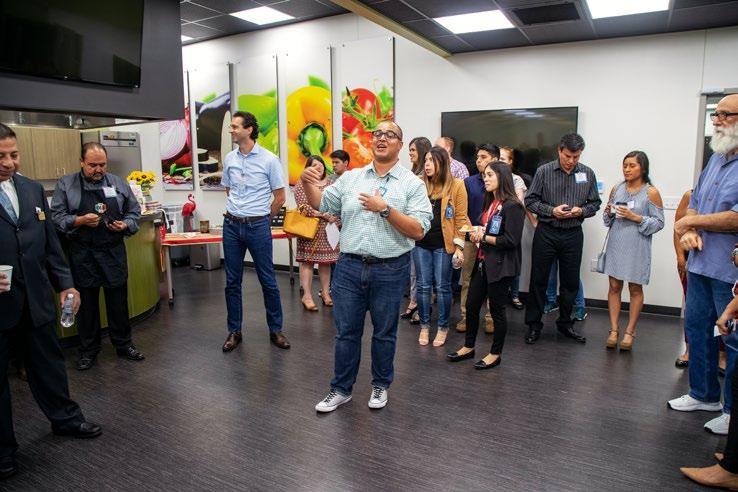
clients solve current accounting issues by researching complex accounting guidance. Focusing on addressing current issues fit my personality well.”
As a first-generation college student, Castro received little career advice from his parents so he turned to mentors, which led to identifying the distinction between a mentor and a sponsor. “You can have both. A mentor guides you when you have complex questions and issues, when you’re vulnerable and open,” he explains. “A sponsor sees you in a positive light, rather than showcasing your deficiencies. Mentors have helped me think things through early on with decisions. I’ll always be thankful to them for providing that feedback and helping me get promoted.”
Castro used the network he’d developed within PwC to move to Miami. “I started to develop a reputation that I did good work and got picked up by different teams,” Castro says.
In 2014, he moved to Royal Caribbean, providing technical accounting advice on complex accounting matters. Fed up with Miami traffic and searching for a more rewarding career, he came to Walmart’s HQ in Arkansas in 2016. “Coming from a lowincome family, Walmart’s mission of ‘Saving our Customers Money’ so they can live better resonated with me. My mom worked at Walmart when I was in high school and loved the company,” Castro says.
There he evaluated his corporate maturity, leveraged down, and acquired
more mentors and mentees. Today, as the director of international controllership, Castro provides strategic accounting support to Walmart’s Mexico, Central America, and Chile markets. He also supports Walmart through global initiatives, critical accounting matters, and earnings cycles.
A servant leader, Castro supports fellow associates and mentees, viewing situations from all perspectives. “I try to lead with empathy and an understanding of where they are in their careers, what they aspire to,” he says.
His position allows him to engage within the community and mentor college students, connecting Latino students with Latino leaders. Though, he admits, it’s difficult mentoring those he leads. “You’re in a leadership
Over


www.acxiom.com


position to achieve a specific goal,” he explains. “But I try to align their long-term goals for what they’re trying to achieve. Most of my mentees are not in my area.”
Walmart, says Castro, has several established associate resource groups (ARGs) that have enriched cultural awareness, increased engagement in the local diverse communities, and created a greater sense of community and connection among Walmart’s diverse associates. With the help of Walmart, Castro supports local not-for-profit organizations in the Northwest Arkansas region. “Our culture at Walmart is very strong in terms of DEI and involve-

Castro considers himself a “regular guy,” and measures success differently than most. “I might not be an SVP or a VP. We think that success is a title or a dollar figure. More important than a dollar figure or a title is realizing what makes you happy and what gives you the best balance in terms of what you want to do versus what you have to do,” Castro says.
The philosophies of innovative leaders have the power to inspire and spark change. Read on for the thought-provoking insights of these successful executives.
BY FRANK DIMARIA
Thirty-eight years ago, Robert Quintanilla took a job as a baggage handler with Southwest Airlines to get his foot in the door. Today, he leads 253 employees, 12 team leaders, and 6 managers across 5 distinct groups.
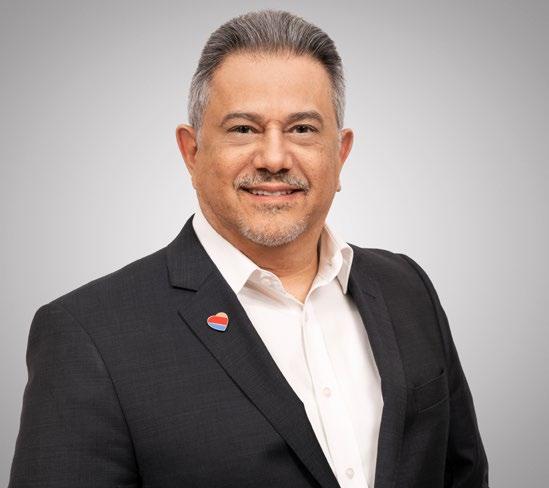
IN 1985, SOUTHWEST AIRLINES WAS fourteen years old and operated routes that flew into just thirty airports when Robert Quintanilla joined as a baggage handler. Today, the company operates at 121 airports across 11 countries and operates more than 4,000 flights a day during peak travel periods, while Quintanilla has moved through the company into his current role as managing director of technology services and operations.
Quintanilla has spent the past thirty-eight years growing with Southwest. He earned a degree as an electronic technician from the University of DeVry Institute of Technology before joining the airline company.
“I got my foot in the door because I heard this was a great company to work for, and I wanted to be part of it. Southwest
was growing tremendously at the time,” Quintanilla says.
A year later, he was working for technical services as a field technician, performing hardware component-level troubleshooting and repairs in the airports that Southwest served. The hardware equipment included X-Ray machines, flight information display systems, payroll clocks, and reservation terminals.
“This was before the TSA took over the responsibility of all security equipment. We’d have to fly to all these airports when they had broken equipment. We’d replace it or try to repair it on-site so we can keep the operations running,” says Quintanilla, who was one of just six field technicians in 1986.
Eventually, Quintanilla began managing field projects, where he worked with the
Robert Quintanilla Managing Director, Technology Services & Operations
Southwest Airlines
corporate facilities team to expand and modify Southwest’s airport locations. He provided cost estimates from a technology perspective. He ordered all equipment and managed the scheduling of field technicians to install and test equipment for these projects.
His biggest challenge was when Southwest acquired AirTran and he had to transform its facilities to what Southwest required. He managed upgrading up to three airports at a given time.
In his current role, Quintanilla leads 253 employees, 12 team leaders, and 6 managers across these 5 distinct groups.
The service management team helps improve service quality and govern processes within
the organization, such as ticket escalation management, reducing incidents, managing requests, and reducing operational costs.
“Service management puts governance around our processes so that we keep incidents low and to help resolve critical incidents quickly,” Quintanilla says.
The headquarters corporate campus support team maintains all hardware equipment such as computers and audio and visual systems in the seven buildings located on Southwest Airlines corporate campus. It is also responsible for refreshing over six thousand computers annually to maintain up-to-date serviceable equipment.
The technology enterprise command center team facilitates all critical incidents or outages. It’s a 24/7 group that rallies support teams quickly to systematically isolate software, hardware, and network issues.
“We have to move quickly and resolve our critical outages as soon as we can,” Quintanilla says. “It’s a matter of keeping our internal systems up and running.”
The disaster recovery team manages and documents all technological risks, while working with appropriate teams to correct issues discovered by internal audit. It also
“We’d have to fly to all these airports when they had broken equipment. We’d replace it or try to repair it on-site so we can keep the operations running.”
documents support processes for events like hurricane responses and air accidents.
The team must be flexible and prepared to lead the technical division through any situations that may arise. To prepare, the team leads multiple tabletop exercises of mock scenarios to keep support teams ready and prepared for an event.
Quintanilla’s fifth group is the service desk, which is a 24/7 technical call center. The team takes incoming calls that are technical in nature from anyone in the company. It handles over sixteen thousand interactions monthly and maintains a 78 percent first-time fix.
In 2017, this team was recognized and labeled as “World Class” by an external company that performs performance benchmarking specifically for service desk teams across the US. The service desk’s top priority is to provide exceptional customer service and resolve issues quickly.
Working in a dynamic environment like air travel can present significant challenges in
technology services and operations. Over the years, Quintanilla and his team have learned to use the past as learning opportunities to establish a set of best practices that minimize the effects of things like critical outages or disaster recovery if and when they arise.
“My team works really, really hard to be prepared in these situations so they can resolve issues in a quick and efficient manner,” Quintanilla says.
In 2018, Quintanilla implemented a walkup support channel called the “Tech Zone” modeled after Apple’s Genius Bar to support employees on Southwest’s corporate campus. Users can walk up or schedule a time to consult with a Southwest technician to resolve computer or software issues. “They can just bring their laptops over, and the team can help fix any issues on the spot,” Quintanilla explains.
Resolving technical issues is his team’s main focus, but the Tech Zone helps create an environment of hospitality and a great customer experience for Southwest employees. In 2023 they handled over twelve thousand customer interactions meeting
a four-minute average wait time and a twenty-seven-minute interaction time.
As a leader, Quintanilla values communication, holding weekly staff meetings with his leaders and learning about what’s going on in each of their areas. He prefers to “coach from the sideline,” staying out of his reports’ way and giving them room to lead.
“I always tell my team, ‘Our team may not directly produce revenue for the company and that’s OK. Our biggest impact is supporting our internal and external customers.’ Providing the best hospitality and helping ensure our technology is reliable helps the airline continue to operate and run smoothly,” Quintanilla says. “We must provide this type of value-add service in order to be considered successful.”
In 2023, Southwest Airlines piloted a mentorship program, during which
Quintanilla mentored three Southwest employees over a five-month period.
“It was just sharing experiences. They asked questions on scenarios or how to gain viability or how to approach certain projects,” Quintanilla recalls. “I like to give advice to help people in their careers. Being here thirty-eight years, I’ve seen and experienced a lot. I too had great mentors in my life myself and through my career.”
“Southwest’s philosophy is happy employees equal happy customers, which equals happy investors,” Quintanilla says. “Southwest puts their employees first. They are treated with the same respect and caring attitude that they are expected to share externally with every Southwest customer.”
After thirty-eight years, Quintanilla still appreciates the care and support that Southwest Airlines continues to provide.

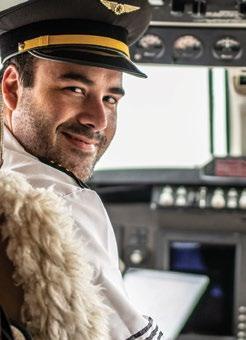



BY ZACH BALIVA
Italo Intriago made his ambitions clear after years as an individual contributor, and now, he’s leading a critical enterprise hardware services team for software giant Red Hat
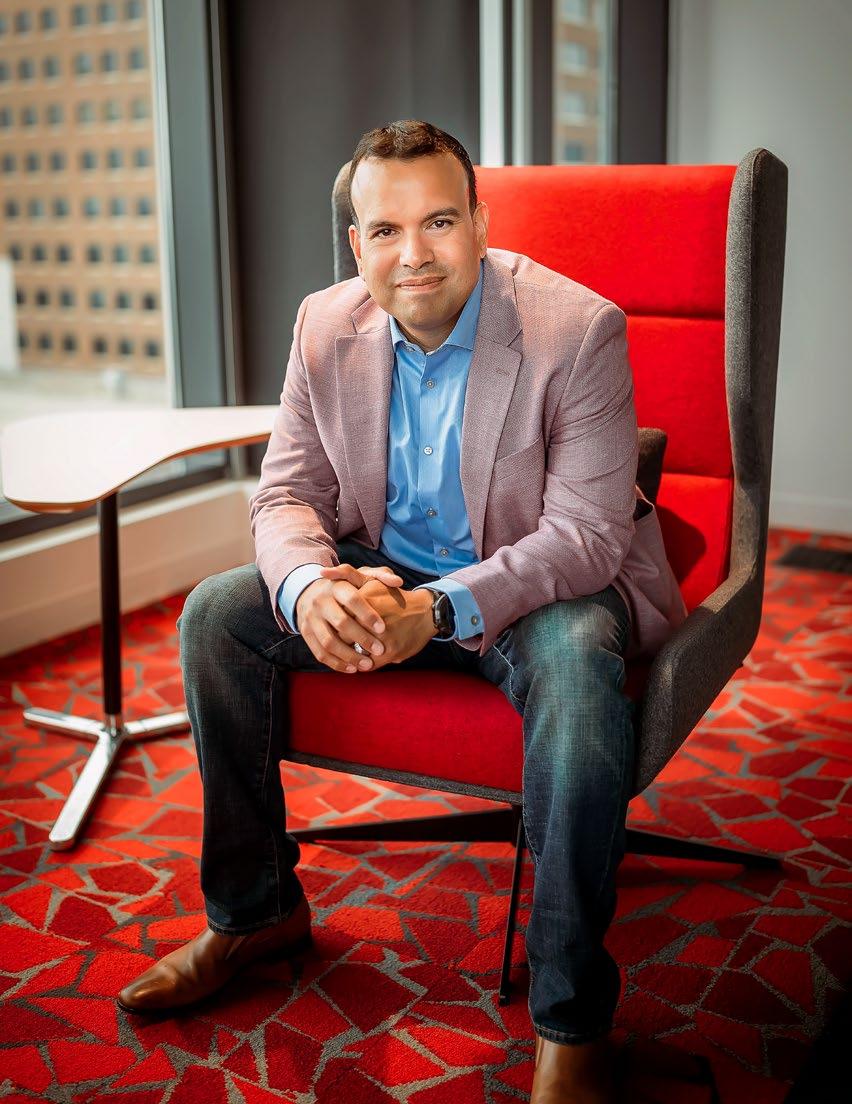
advocate,
major
He grew up loading Red Hat CD-ROMs into his desktop computers. Now, Intriago has grown alongside his organization. He made his leadership ambitions known after working for many years as an individual contributor.
Intriago values leadership, and never takes for granted an opportunity to be a mentor for others. And in his role as manager of enterprise hardware services at Red Hat, he has been able to do just that.
“I enjoyed contributing to a team that did great work and got accolades as a group, but I wanted to give back,” Intriago says of his desire to move into leadership. “The only way I knew how to do that was to change myself.” He did that by asking for opportunities to develop new skills, lead projects, and guide individuals.
Intriago also elevated his career by entering Red Hat’s official mentoring program, and he took a unique approach. “I chose a mentor outside of IT so I could learn more about the business and grow as a leader,”
he explains. Intriago’s mentor—a finance executive—helped him see how budgets and purchasing processes interact with what engineers, project managers, and others do in IT.
At the same time, Intriago enrolled in a Red Hat leadership training program to make sure he was ready to go what the right opportunity presented itself. He became a full-time manager in 2021.
When he’s not leading teams at Red Hat, Intriago can often be found mentoring and volunteering at the church his family attends. The father of two has been a youth leader for about fourteen years. He says that’s part of what made him want to move into management. “My spiritual life is all about helping others by sharing my experiences and letting people know who I am,” he says. “I started realizing that I could do that more and more in my work life, too.”
Today, Intriago leads his own team of diverse professionals who work together to


power and protect Red Hat’s data centers, servers, and complete IT ecosystem. His enterprise hardware services team also manages large IT projects. With twelve data centers and nine employees spread across three countries, Intriago takes special steps to ensure he builds comradery and enables communication.
Intriago, who is in Raleigh, North Carolina, starts his tasks early so his workday will overlap with his colleagues in Europe and the UK. They communicate often via email and Slack, and have adopted the scrum agile framework to complete major project phases in two-week sprints.
As many companies shift to remote work with teammates scattered across the globe,
A leader’s job is to define goals and remove obstacles.
Trust those on your team to do the job you hired them to do.”
many workers and managers are finding themselves in situations similar to Intriago’s. He says other leaders who are seeking to build cohesive remote teams should over communicate.
“Check in often without micromanaging,” he says. “A leader’s job is to define goals and remove obstacles. Trust those on your team to do the job you hired them to do.”
One of Intriago’s biggest projects now involves moving the largest Red Hat Lab in Westford, Massachusetts, to a new Research Triangle Park Data Center. He’s also looking at all eleven of Red Hat’s Data Centers to determine how the company can cut
costs and stay competitive in specific markets while keeping costs low and uptime high. Lastly, Red Hat’s enterprise hardware services team is tapping into resources from parent company, IBM, to prepare for next-generation OpenShift AI services.
In 2024, the company plans to continue building an inclusive culture, leading the open-source community, and harnessing the potential of AI to help users find innovative ways to solve difficult challenges. The entire IT department will power those goals, and Intriago and his enterprise hardware services team is ready for action.

BY JOSEPH STARK
How Cerence is staying true to its mission

CERENCE, A LEADING PROVIDER OF automotive assistant technology that aims to become the heart and soul of the digital car, had an exciting 2023—especially in the final few months. From partnering with other industry leaders to provide better in-car experiences to tapping on new leaders with fresh perspectives, the company has seen no shortage of highlights.
In December 2023, the company announced that it had partnered with NVIDIA technology to create Cerence Automotive Large
Language Model (CaLLM) to help its automaker customers improve the user experience. According to a press release, CaLLM features a unique level of automotive-specific intelligence. That intelligence draws from the company’s state-of-the-art automotive dataset, which encompasses billions of tokens and can distinctly support automotive functions, features, and customizability. Some of its other features include user personalization in addition to built-in information retrieval capabilities.
CaLLM is currently in proof of concept with leading automakers and will be demonstrated at CES 2024.
August 2023 saw the company bringing its expertise to a new area of transportation: trucking. Boson Motors, a Bay Area-based electric truck company, decided to leverage the company’s text-to-speech solution to lend emotional intelligence and personality to its vehicles. It’ll assist in creating a conversational artificial intelligence (AI) experience with an updated driver event notification system.
“As Cerence expands to new areas of transportation, we’re proud to partner with OEMs [original equipment managers] like Boson Motors, who is leading an important transformation in trucking through advanced electrification and autonomy,” said Cerence CEO Stefan Ortmanns in a press release. “By integrating Cerence TTS into the in-vehicle experience, Boson will bring an enhanced level of productivity and emotional intelligence to its electric trucks, advancing toward an immersive in-vehicle experience.”
In September 2023, the company named Christian Mentz as chief revenue officer, who is responsible for leading the company’s global sales and business development, sales engineering, and marketing organizations.
Mentz joined the company after more than four years in various roles at Amazon, where he successfully led the global business and the marketing organization. The leader has also demonstrated a passion for innovation, having served as an advisor to Dessa, an AI and machine learning firm.
“Having spent a substantial part of my career working on the intersection of AI and automotive to drive advancements and collaboration in infotainment and the digital cabin, I am honored and excited to join Cerence as its chief revenue officer,” Mentz said in a press release. “As our industry continues to undergo significant transformation, I look
forward to working with the entire Cerence team to leverage our deep expertise as a pioneer in automotive and generative AI to propel innovation in partnership with our customers worldwide.”
In October 2023, Cerence filed a patent infringement lawsuit against Samsung Electronics Company and Samsung Electronics America. The suit covers certain core technologies like industry-leading voice recognition, handwriting recognition, and wake-up words—technology the company said is “foundational to Cerence’s product portfolio and its work with the world’s leading mobility OEMs.”
“Cerence has full confidence in the strength of its patent portfolio and plans to vigorously defend its intellectual property rights,” said Jennifer Salinas, senior vice president and general counsel at the company, in a press release. “This lawsuit against Samsung is necessary to protect significant R&D and other investments, as well as our deep heritage and culture of innovation. We remain committed to having our intellectual property rights respected and enforced.”


Dechert’s top-ranked antitrust team delivers innovative strategies and proven expertise to help you overcome the most challenging legal obstacles and achieve your business goals.
We’re always grateful to partner with someone like Jennifer Salinas of Cerence, whose foresight, energy and creativity perfectly match our firm’s core principles.
dechert.com/antitrust


BY ZACH BALIVA
How visionary HR leader Michael Alicea has redefined success and shown his community what’s possible
MANY FORTUNE 500 COMPANIES HAVE methodical ways of being successful as they carry on daily business. Over his thirty-plus-year career as chief people officer at both NielsenIQ and Nielsen, while also a public board member of Emerald Co. (EEX), Michael Alicea developed three cardinal rules of his own for executives.
1. Don’t work for people you don’t respect.
2. Put yourself around smart people who have hard work to do.
3. Value transformational opportunities where you can make an impact.
Over his tenure at Nielsen, Alicea became a go-to person, and he did it by outworking everyone around him.
“I was willing to sacrifice my time to bring results and make a difference, and that was a good brand to build for myself,” Alicea says. “I tell early career employees to do the same. Volunteer early and often for the hard assignments. Run to the problem.”
In his role, he served as part of a critical due diligence team that analyzed and completed acquisitions, which later generated
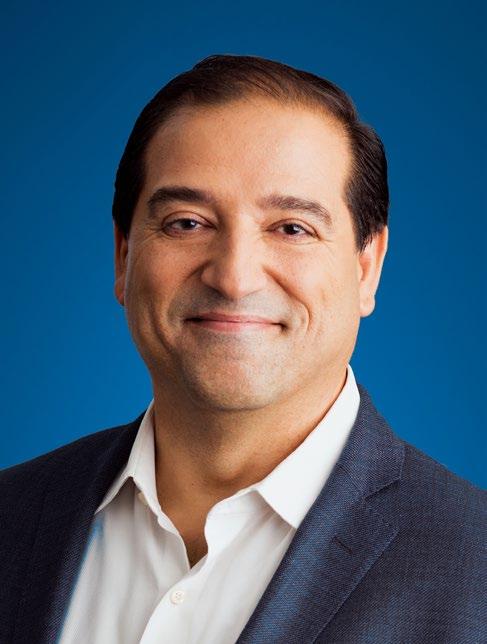
billions of dollars. When his time at Nielsen drew to an end, he had opportunities to join many different Fortune 500 companies.
Head-hunters were calling. What made the recruiters so excited? The dramatic, consistent, and repeated outcomes that happened in difficult environments through his leadership. Alicea has led complex HR operations across one-hundred-plus countries in over six continents and operated within both public and PE environments. He enjoyed the challenge of resource-constrained environments where creativity can be used to create great outcomes.
“This is a super insulated industry where a majority of people and especially leaders are middleaged men from within the cybersecurity industry.”
He was steadfast in his desire to find the right match for his vision. In the end, he chose Trellix, where he is now chief human resources officer. Alicea felt that the firm represented his integrity and sense of purpose, something Alicea learned from his Puerto Rican parents. Alicea’s father was an elevator operator who held many other jobs, while his mother worked just as hard as a homemaker in New York.
Alicea was fascinated by numbers and processes. He attended a high school that specialized in aviation career and technical education, and then studied business administration at Baruch College. That’s where an employer gave him an assignment that would change his life.
Alicea was asked to work on a compensation project that combined his ability with numbers and people skills. He was able to deliver the project early. The boss, noticing how quickly Alicea was able to connect with
other individuals, convinced him to change his major and graduate with a dual degree in HR and business operations.
All of Alicea’s experience eventually led him to meet Bryan Palma, CEO of Trellix, a global cybersecurity firm with an open and native extended detection and response platform that forty thousand businesses and municipal customers rely on. As the two talked, Alicea realized that Palma and Trellix checked at least two of his boxes. He is someone Alicea respects, and the company is full of smart people doing hard work.
But what about number three: transformational opportunities? As Alicea dug in, he learned about the disparity in cyber talent.
“This is a super insulated industry where a majority of people and especially leaders are middle-aged men from within the cybersecurity industry,” he says.
There are few women, few African Americans, and fewer Hispanics. Additionally, the
industry has at least three million unfilled positions. Alicea, who previously built diversity, minority leadership, and early career programs at other organizations, had finally found a worthwhile challenge and a job he could take without betraying his principles.
He jumped right in. “This is important work, and this is a for-profit business,” Alicea says. “I wanted to build an organization that will help us beat out competitors. Let’s bring them onto a playing field that they can’t compete in.”
And that’s exactly what Alicea has done. Trellix’s leadership is more inclusive now and so are 34 percent of all new hires. How has Alicea accomplished this? By understanding what was really important in getting the work done and changing job postings so people of color and women don’t self-select out as often. “When you have three million open jobs and you’re only pulling from a select population, you
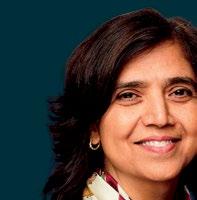

are never going to reach your goals,” he explains. Trellix now focuses on skillsbased hiring.
Alicea is thrilled his work is helping Trellix and the cybersecurity community, but he’s most pleased to be helping others change the trajectory of their careers. “These are six-figure jobs that will change many lives for underrepresented professionals,” he says.
Giving back is important to Alicea because he remembers a time when help was hard to find. Now, he’s on the board of the Hispanic Alliance for Career Enhancement,
where he focuses on getting people of color into tech roles. He also cochairs the National Initiative for Cybersecurity Education program for the National Institute of Standards and Technology.
As he continues to elevate both his company and his community, Alicea encourages others to find innovative ways to do the same.
“The quietest voice in the room often has something important to offer,” he says. “If you’re Hispanic and you become an executive, you have to give others a voice. You have to lend a hand.”


BY LUCY CAVANAGH
Alejandro de Castaneda believes that commitment to understanding different countries adds to the bottom line
WHEN ALEJANDRO DE CASTANEDA joined Weatherford in early 2023, he brought along a global mindset. With an MBA and over twenty years of experience on the international stage, de Castaneda took on the role of vice president of finance for the financial planning and analysis (FP&A) function for the global oil field service company, which operates in over seventy countries.
“The best way for me to drive change is through collaboration,” de Castaneda says. “To have effective collaboration, you need to be able to build trust and strong relationships. It is important to understand the business and the people you are working with and the realities of different cultures.”
Since de Castaneda joined Weatherford, the team has been focusing in simplifying the company processes, the footprint, the service

quality, and creating more value for shareholders. All of these initiatives aim to make the company more profitable, agile, and resilient.
Weatherford has seen immense growth in its profit over the past three years, as well as unprecedented cash generation.
“When I received the call to join Weatherford I had no doubts. . . . The technology has always been there, and our products and services are top notch,” de Castaneda says. “The company was already undertaking a profound change, and we had to continue executing the strategy and increasing the focus on what we can do at the company’s bottom line—how we make sure the revenue we generate has the quality to translate in returns, profitability, and free cash flow.”
Part of that process includes unifying Weatherford’s strategy across the globe. His
VP of Finance FP&A Weatherford
Being open to understanding other cultures helps you tremendously to shape the way you work and to become a better leader.”
international experience allows him to see ways of accomplishing that goal while also being aware of the particularities of different countries and regions.
Originally from Spain, de Castaneda began his university studies in Madrid and finished in Italy before earning his MBA at the Instituto de Empresa in Madrid. He earned a spot in General Electric’s rigorous financial management program in Italy, in which he completed four-to-six-month rotations in different positions within finance in Italy and the UK.
Afterward, de Castaneda landed a role within GE Oil and Gas and was assigned to manage the finance department throughout Latin America. He was based in Houston while still reporting to the headquarters in Italy.
“I was doing a lot of business integration across the region and it was a
tremendous learning experience because each country is very different from the other,” de Castaneda explains. “Argentina is very different from Venezuela, even if they speak the same language. Brazil has nothing to do with Argentina, even though they border each other. It was very rewarding from the standpoint of meeting different cultures, but also because I had the opportunity to help to integrate businesses together from different realities and gain tremendous experience as a leader.”
In 2017, de Castaneda moved on to Exterran to lead and rebuild the FP&A function. His previous experience at GE and his processoriented mindset was critical to build the new FP&A organization, reshape financial forecasting, enhance analysis capabilities, and help grow the company through streamlining
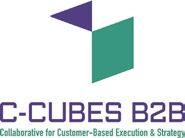








C-CUBES B2BTM enables CEOs to implement the Customer-Based Execution and Strategy (CUBES) framework at their company to achieve sales growth, executive focus, and employee alignment. CUBES B2BTM uses multi-year benchmark studies of more than 40,000 customers and 3,000 companies to leverage peer-reviewed research for strategic success.
C-CUBES B2BTM provides start-to-end strategy consulting and implementation services. C-CUBESTM utilizes state-of-the-art analytics, executive coaching, and facilitation, access to proprietary benchmark assessments, and bespoke consultation. Recent clients were able to increase sales by 13-28% relative to industry cohorts using our services.
“To have effective collaboration, you need to be able to build trust and strong relationships.”
processes and connecting financial performance and operations.
His continued focus on business operations moved de Castaneda out of finance to commercial operations in 2020 to lead the North and Latin American regions of the company. During that period the Americas region achieved the highest growth, profitability, and free cash flow (FCF) generation since the spin-off. Exterran was acquired in 2022, and he helped with all the transitions to guarantee a smooth merger.
Not long after, de Castaneda got a call from Weatherford. He came on to lead the FP&A organization and help to continue simplifying processes and creating standardization for the very complex global company.
“The idea was to improve financial forecasting capabilities and overall financial analysis,” de Castaneda shares. “We wanted everyone to be accountable and to intensify the focus on returns, profitability, and cash.”
De Castaneda’s global mindset goes beyond his work. Having lived and worked in different countries for decades, his and his wife’s values have been shaped by their understanding of different points of view. The two met when they were working for General Electric in Italy and bring their combined cultures and heritage to their family.
For that reason, de Castaneda’s family decided to put their two kids in an international school to give them as much exposure to a variety of cultures as possible.
“We wanted them to learn why people think in different ways,” de Castaneda explains. “The best way is to surround yourself with diversity. Every year at their school, there is a parade called the March of Nations, and they’ve had more than eighty countries represented, which is absolutely amazing. Being open to understanding other cultures helps you tremendously to shape the way you work and to become a better leader.”
International businesses present unique challenges— and opportunities—for corporate citizenship in multiple countries. The executives featured here thrive in navigating cultural shifts worldwide.
BY NOAH JOHNSON
Lisette Méndez shares how her passion for continuous learning informed her journey from engineering to finance throughout her thirty-year tenure at AT&T
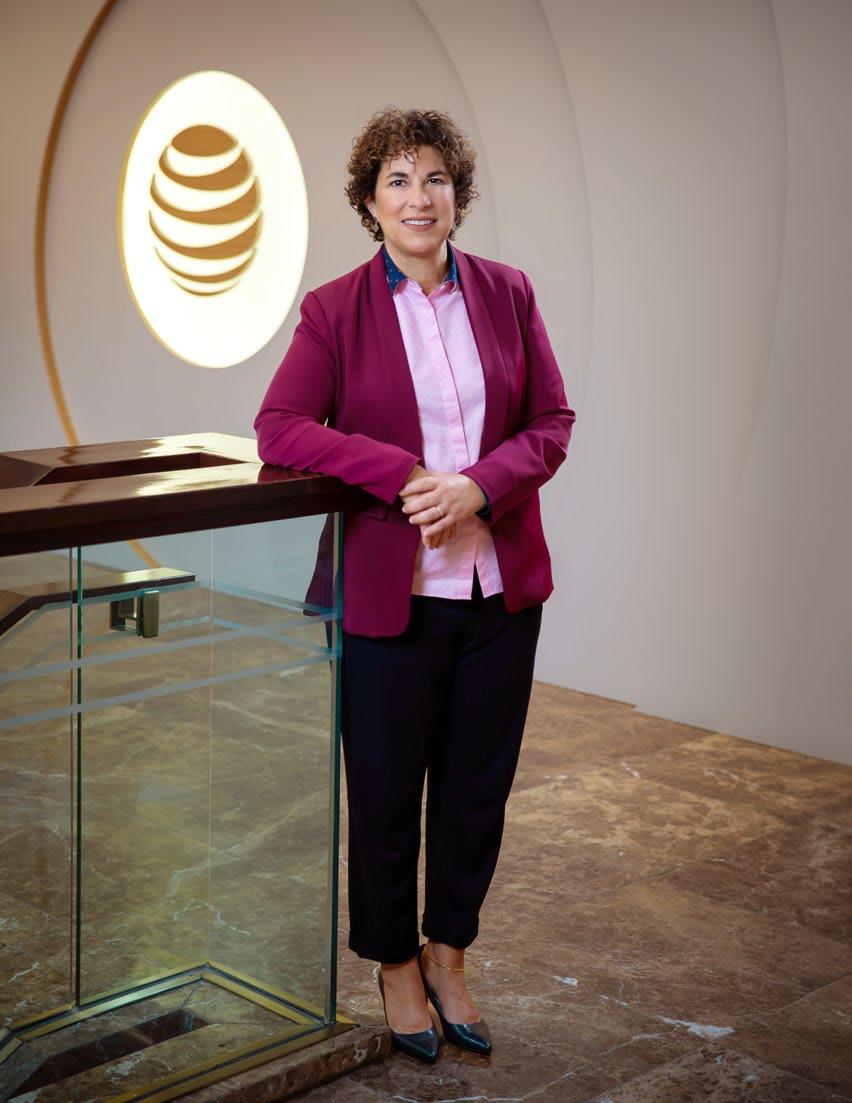
Méndez VP, Latin America Controller AT&T
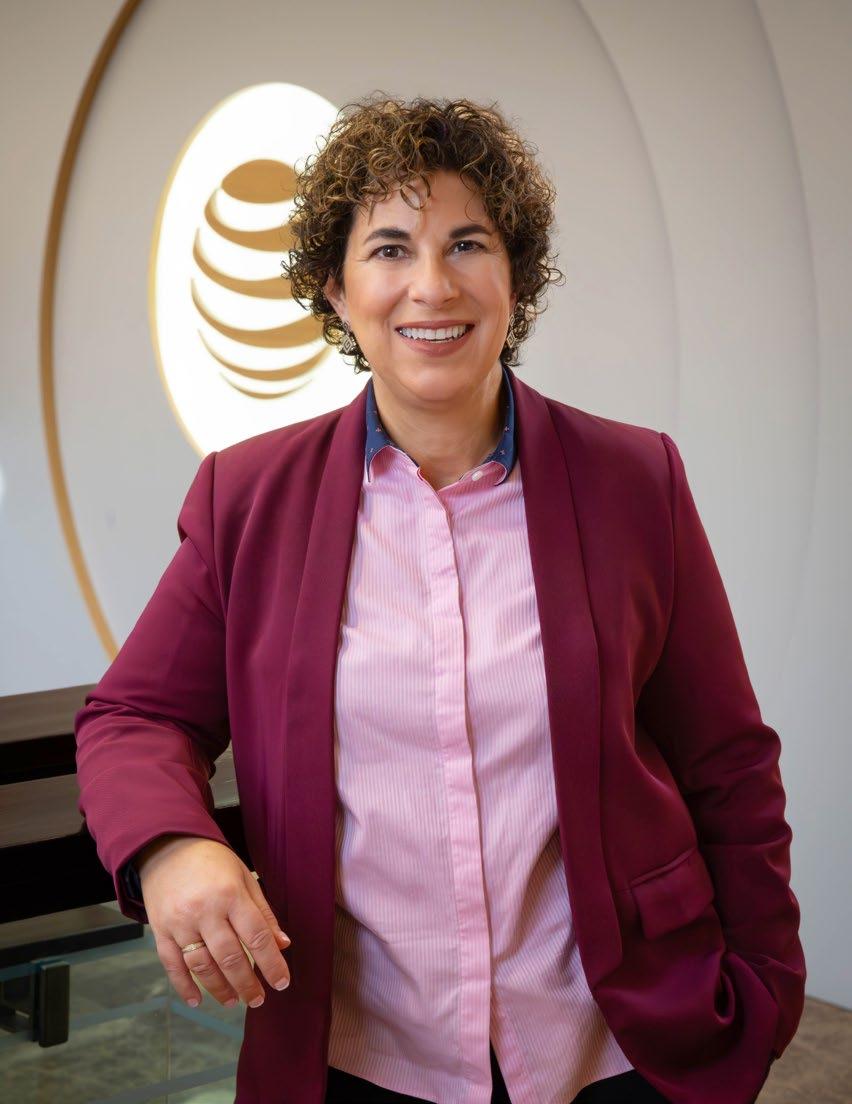
LISETTE MÉNDEZ IS THE DAUGHTER OF Cuban immigrants who came to the states with little to no education. They relied on their practical skills and common sense to help build a life for their family in an unfamiliar place. Safe to say that it rubbed off on Méndez, who was born with an insatiable appetite for knowledge and a knack for problem-solving.
“I loved learning, whether it was watching my father work on projects, watching my mom cook, or watching TV to teach myself how to play tennis,” she says. “In the summers, we didn’t use air conditioning, so I spent hours in the library reading books and learning about as much as I could. Those things instilled my core values of curiosity, taking risks, learning new things, and imagining how people in different places lived.”
As a person who was drawn to cause and effect and patterns, Méndez grew up believing her future would be in STEM. Her interests prompted her to get an engineering degree from the University of Pennsylvania and to take on an engineering role at AT&T more than thirty years ago.
But her love for continuous learning wouldn’t allow her to stop there. As she rose the ranks in the company, she kept working on cross-organizational projects and in roles that were closer to the finance department, including as a director of payment processing for business customers. She became increasingly intrigued by a key challenge financial professionals face—the ability “to go beyond the numbers.”
“The numbers are the easy part. It’s really about how to be a strategic partner with the business to help them solve problems that are reflected in the numbers,” Méndez explains. “It is always exciting to understand the business, to create key performance indicators to help my colleagues see how certain actions manifest themselves in the numbers. Also, as I took on cross-organizational projects, I realized that I was good at connecting what was happening operationally and financially.”
I lead by listening, asking questions and trying not to be prescriptive. I try not to focus on what went wrong but what my teammates might have learned. I once heard that failure is a fertilizer; that resonates with me.”
Leaders started to notice that strength and encouraged her to get an MBA in finance, to obtain her CPA license, and to take on greater responsibilities. By the time SBC and AT&T merged in 2005, she was formally reorganized into the finance department. She went on to serve in a wide variety of leadership roles within finance, including supporting internal controls and Sarbanes-Oxley, a CFO director of customer services and technical sales, a director of strategic investment analysis, and an assistant vice president of corporate financial planning directly supporting the CFO and board of directors.
Today, she serves as vice president of finance and Latin America controller. As controller she oversees a scaling mobility business that generated more than $3 billion of revenue in 2022. She is also the finance operations executive leading company-wide payroll and accounts payable. In her roles, she’s proud to be an empathetic leader who encourages risk and is committed to growth.
“I lead by listening, asking questions and trying not to be prescriptive,” she says. “I try not to focus on what went wrong but what my teammates might have learned. I once heard that failure is a fertilizer; that resonates with me. I also put an emphasis on collaborating while driving a level of accountability.”
The decades Méndez has spent at the company have been filled with highlights, including helping the company develop a
5G strategic business case before it was a hot-button topic of conversation. But one of her proudest moments was being called to step into her role as Latin America controller in 2021. She loves getting to speak Spanish at work. She also loves that it’s allowed her to focus on transformation to help team members navigate through change.
“Change is hard for people. The pace of change and evolving technology like AI is going to be a fascinating catalyst,” she explains. “It’s an area where I am going to be working with my team to embrace. There is a lot of opportunity for generative AI. It will
be important for my team; the key is going to be how they embrace it to upskill their skill sets.”
Méndez admits that in the early stages of her career, she wasn’t intentional about pursuing her goals. She says she “ended up going where people wanted me to go and relying on my work to speak for me,” a pattern that hindered her growth. That’s why she advises young people to speak up about what they want and where they want to be in order to be successful.
“Raise your voice,” Méndez says. “Others, including me, will want to hear what you have to say.”

Committing to diversity, equity, and inclusion (DEI) encourages us to share new perspectives and embrace bold thinking. Collectively focusing on DEI brings people together in ways that help organizations make an impact that matters.
See what DEI powers at deloitte.com/us/dei.
BY NOAH JOHNSON
Valeria Plastino shares how growing up and practicing law in Argentina prepared her to help her team at Cirion navigate change


VALERIA PLASTINO’S LEGAL JOURNEY has taken her all around the world, but one of the most valuable lessons she learned came from practicing law in the country she grew up in for more than fifteen years and in the United States for almost a decade.
“Argentina is a country that’s gone through a lot of turmoil, frequent ups and downs from a macroeconomic, political, and business perspective,” reflects Plastino, who serves as executive vice president, general counsel, and ethics and compliance officer at Cirion, a leading digital infrastructure and technology provider. “That teaches you about endurance, resilience, and finding solutions while navigating the uncertain, no matter how big the obstacles seem to be. In the last few years, we’ve faced a huge transformation within the company, and you’re very well trained to take that on when you’re from a country that
often changes dramatically within a short period of time.”
That training has made her an anchor for her colleagues during her tenure with Cirion. She’s helped the company thrive during multiple acquisitions and culture transformations, and she has continued to do so during the recent sale of Lumen Technologies’ LATAM business unit, where she worked for over fifteen years and ended up with the creation of a new technology and digital infrastructure industry player: Cirion Technologies.
After Cirion was divested, the unit was sold to a private investment fund that focuses on infrastructure and sustainable development. As a result, Plastino has been tasked with partnering with the investor to create a new governance framework for all operating companies and to adopt and implement a corporate compliance program aligned
with the investors’ ESG standards, as well as with the company’s new size, culture, and business strategy.
She has been adapting internal policies and procedures while transitioning contracts and business operations from Lumen’s regional business unit to a new standalone and fully divested organization, while also turning an eye towards ambitious long-term growth goals in LATAM with new data center infrastructure construction and M&A opportunities.
In each area, she has prepared and assisted her team to adapt to the ever-changing business landscape with an empathetic, open-minded, and collaborative leadership style.
“It’s essential for every leader to anticipate issues and to be ready to deal with them,” she says. “We should always be ready to learn and be open enough to find new solutions around us—they may come from
unexpected places. As a leader, you should never pretend that you know everything, and you shouldn’t be afraid to recognize that you don’t in front of your team. This is the best way to motivate your team members to collaborate on finding the answers.”
Another large area of focus has been ESG. Last year, a Cirion multi-disciplinary team issued their very first annual sustainability report, which has been an opportunity to rally excitement about the motions Cirion has in store for making the world a better place.
“From the very start, many of our employees were extremely motivated by the idea and wanted to collaborate in any possible way,” Plastino says. “This project has been a very significant milestone in our history as a company. It has given us an opportunity to work with different areas that we might not always have exposure to
VALERIA PLASTINO’S PASSION FOR ESG
“Sustainability is a strong priority for our newly standalone company. Our ESG goals involve a long-term commitment to a sustainable and inclusive business model and the creation of a positive impact in our communities, aligned with our corporate values and business integrity standards, in which I’ve been working at Cirion and its predecessors for over a decade.”
PLASTINO ON MAKING A DIFFERENCE FOR THE WORLD WITH HER CAREER
“When I first started my legal career, I didn’t know all that I could do with a law degree as my career evolved or that I could even develop and impact my own field of practice and the culture around me reflecting my passions, interests, and values into my own career path. As individuals, I believe we all have a mission and the responsibility of making this world better for those coming behind us, and I think my profession gives me a chance to do that, to make a small contribution by supporting my colleagues connecting the world through technology and better business practices.”
on daily basis, as well as learn more about and share the commitment we’re doing for years to come to a sustainable and inclusive business model, aligned with our corporate values and standards of business integrity.”
From an early age, Plastino was drawn to international relations. She wanted to understand how different regions saw the world, their common concerns, and the ways they collaborated with each other. That’s why, after receiving a law degree in Argentina, she embarked on a journey to Italy to perform postgraduate studies on European Union law. After that, she got an opportunity to study international legal studies in the US at New York University. She went on to snag a job as a corporate associate focusing on international corporate practice in New York before heading back to Argentina, helping firms adapt
operations to both US and global standards as a senior associate at a large firm.
Fast forward eighteen years and Plastino was thriving. She was surrounded by family and friends in her home country and had direct responsibility for all legal, regulatory, compliance, and government affairs related to Lumen Technologies’ LATAM operations. She was then offered an opportunity to move back to the US to the company’s new headquarters in Miami.
“It didn’t take much time to conclude that it was an offer that I couldn’t pass up, both from a professional and personal point of view, and I said, ‘Yeah, a fresh new life adventure, why not?’” Plastino remembers. “I’m doing exactly what I was dreaming about when I was choosing a professional career: traveling around the world, working closely with different cultures, embracing
I’m doing exactly what I was dreaming about when I was choosing a professional career: traveling around the world, working closely with different cultures, embracing diversity, and collaborating to create a better future.”

Valeria Plastino embodies that rare combination of talents that create exceptional lawyers – legal acumen, judgement, intellect, empathy, and most importantly integrity. Akerman is proud to support Valeria and the important work she does for Cirion Technologies.


EVP, General Counsel, Ethics & Compliance Officer Cirion Technologies


We Applaud Valeria on Her Vision and Industry Leadership

Ildefonso Mas Partner, Litigation
Miami, FL | Washington, D.C.
202 824 1736
Ildefonso.mas@akerman.com
700+ Lawyers 24 Offices akerman.com
©2023 Akerman LLP.

diversity, and collaborating to create a better future.”
Young people wanting to succeed shouldn’t be afraid to take risk, Plastino recommends.
“Don’t be afraid of getting into whatever you are passionate about,” she says. “Your career success is directly tied to that. Do a job you love, in which you feel recognized, and you will be naturally giving your best and making an important contribution.”
Simpson Thacher & Bartlett LLP is proud to partner with Valeria Plastino and the entire team at Cirion Technologies in support of their mission to further Latin America’s progress through technology. Valeria is an innovative leader and we congratulate her on this well-deserved recognition of her outstanding professional achievements.
With the 2024 US general election in full swing, candidates on both sides of the political aisle courting the Latino vote would be well advised to read this column
By Laura Martinez
As much as I enjoy laughing at political gaffes— like the politico who tried to eat a tamal without removing the husk—I’m here to help prevent the 2024 US general election’s ingenues from many Latino faux pas that have cost previous candidates their posts, many votes, and even more embarrassing memes.
These campaign gaffes run the gamut from silly and cringey to totally offensive. Like claiming to be “just like our abuela,” playing Luis Fonsi’s hit song “Despacito” from their cellphone during a Latino event, or posing in front of a hideous “taco bowl” as proof of their popularity among Hispanics.
Pandering to Latinos with more style than substance has become so popular, that there is even a term for it: Hispandering. Hispandering can be used as both a verb and a noun, and describes someone pretending to like our food, our music, or our language to get our vote—especially when they aren’t truly concerned with the issues we care and worry about.
WARNING: Before you keep reading and/ or vote me off the internet, please remember this column was conceived to be handled with a serious dose of humor.
THE GREAT TAMAL INCIDENT AND VISITS TO EL GORDO
Hispandering is, unfortunately, an American tradition going back to as early as 1976, when Gerald Ford, while campaigning for reelection in Texas, was offered a plate of tamales and bit into them without removing their husk (as one should). This, of course, was a huge embarrassment in a state with the largest population of Hispanics and where, presumably, everyone most people would know how to eat a tamal.
While I’m not 100 percent certain that Ford lost the presidency to Jimmy Carter as a result of the “Great Tamal Incident,” I can assure you this gaffe was only the beginning of the, often, food related exploits. Perhaps because food is the only thing many of these politicians (sort of) know about Latinos, they often opt to their deliver stump speeches at our favorite eateries.
Take all the candidates that have made tactical stops at Las Vegas’ famed taquería, El Gordo, including Elizabeth Warren, Hillary Clinton and President Biden himself, all of whom made headlines by asking for their
favorite taco-enchilada-burrito combo and afterwards posing next to a taquero in charge.
Basically, our people open their minds and their kitchens to these politicians, and all we get in return are a few selfies. Plus, they’re probably contributing to making our favorite watering holes more expensive.
Alas, the cringe is not limited to food. I am old enough to remember when Hillary Clinton, while running for president in 2015, posted a litany of reasons on her website for why we should vote for her because she was really just like our abuela.
The tactic not only backfired but also gave rise to a hilarious Twitterstorm with thousands of Latinos (yours truly included) using the hashtag #NotMyAbuela in a sign of protest and to make sure our grandmothers were not to be compared to anyone—not even “La Hillary.”
Hispandering examples abound, and this writer cannot wait to see what our fearless politicos have up their sleeve for 2024 when an estimated 34 million Latinos will be eligible to vote. Making appearances at a Bad Bunny concert? Speech stumping inside a NYC bodega? Putting a taco on the flag? Oh, the possibilities!



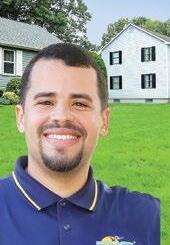






At NaturaLawn® of America, our safer mission and services resonate with customers seeking safer lawn care for their family, pets, and the environment.
Join the leader in organic-based lawn care and start your own local franchise. With an expert franchise support system for sales, marketing, operations, and more, now is the time to invest in your future. Nationwide, major markets are ready for new locations. Contact us today and discover why owning and operating a franchise is the right choice for you. Our New Owners’ Training starts later this year!







Transform your business with data-led insights
CFOs are unlocking growth, agility, and cost management with a data-driven approach to decision making.




